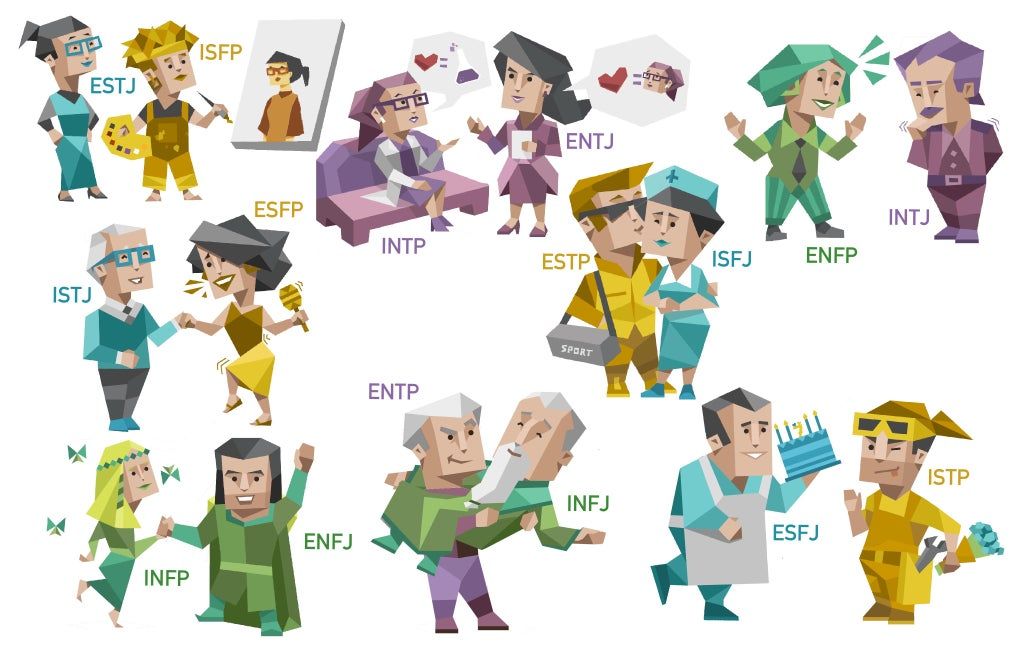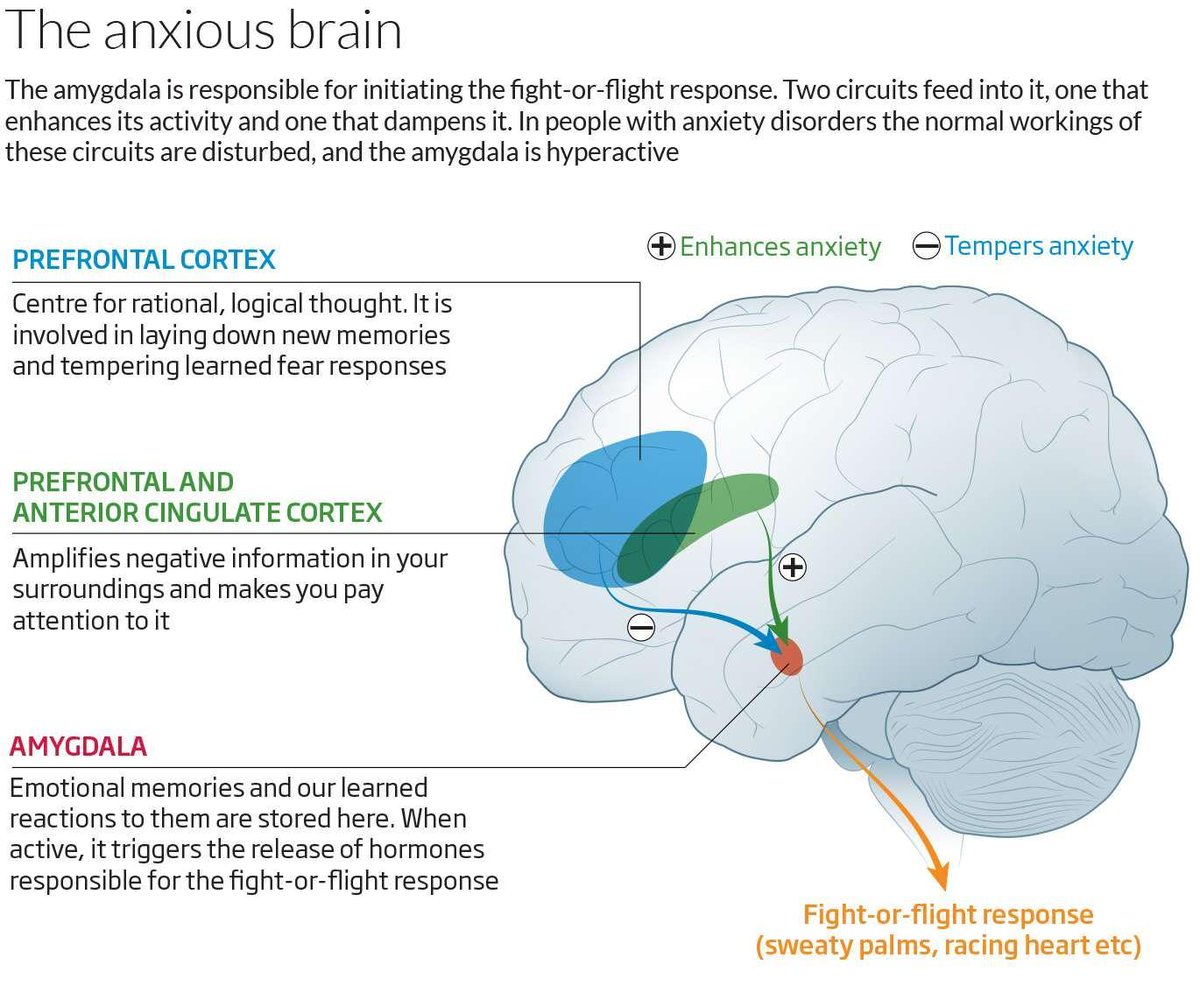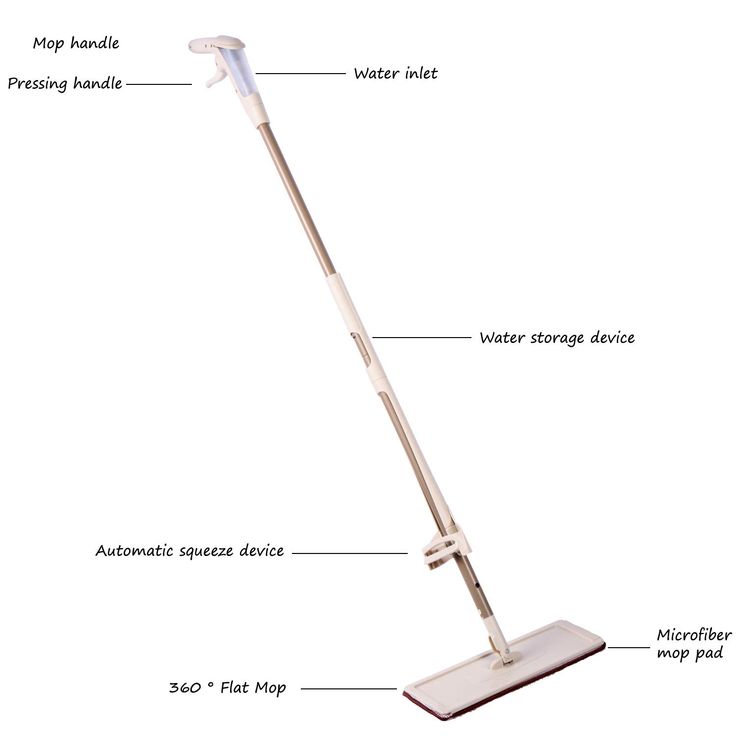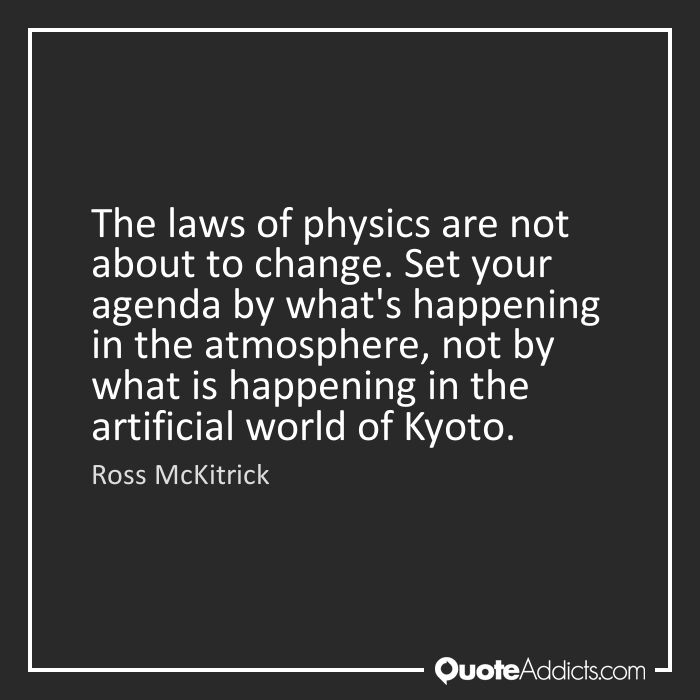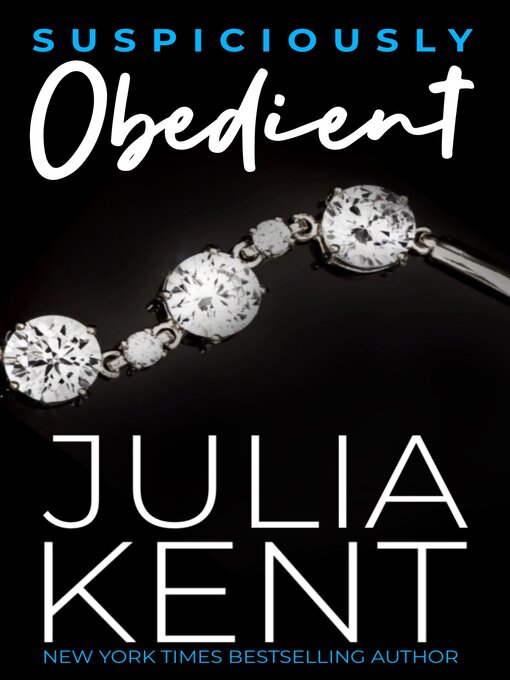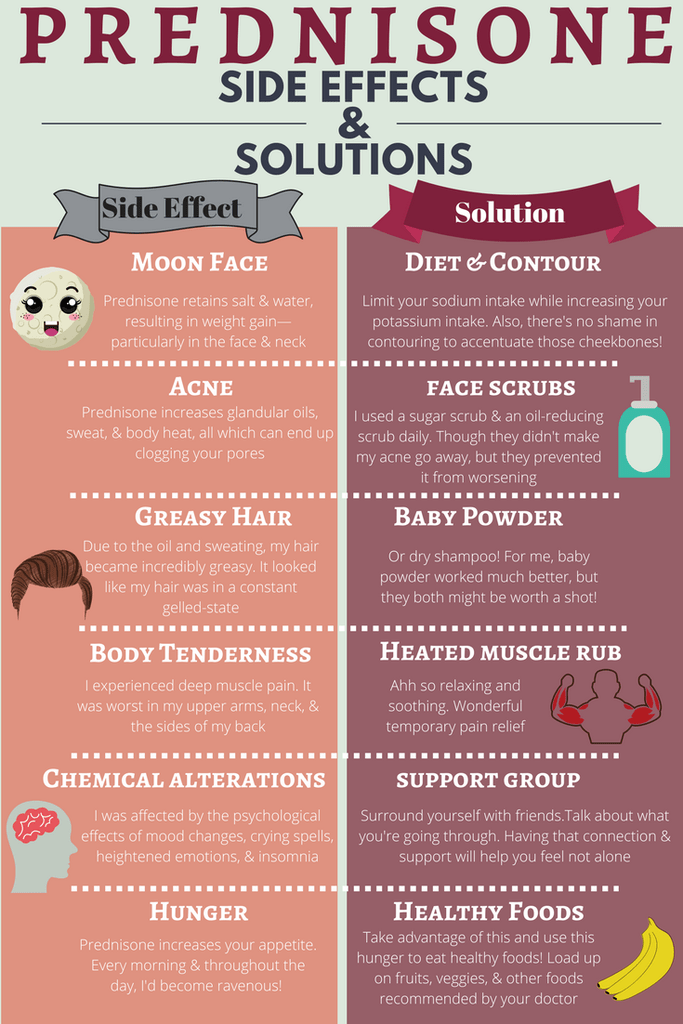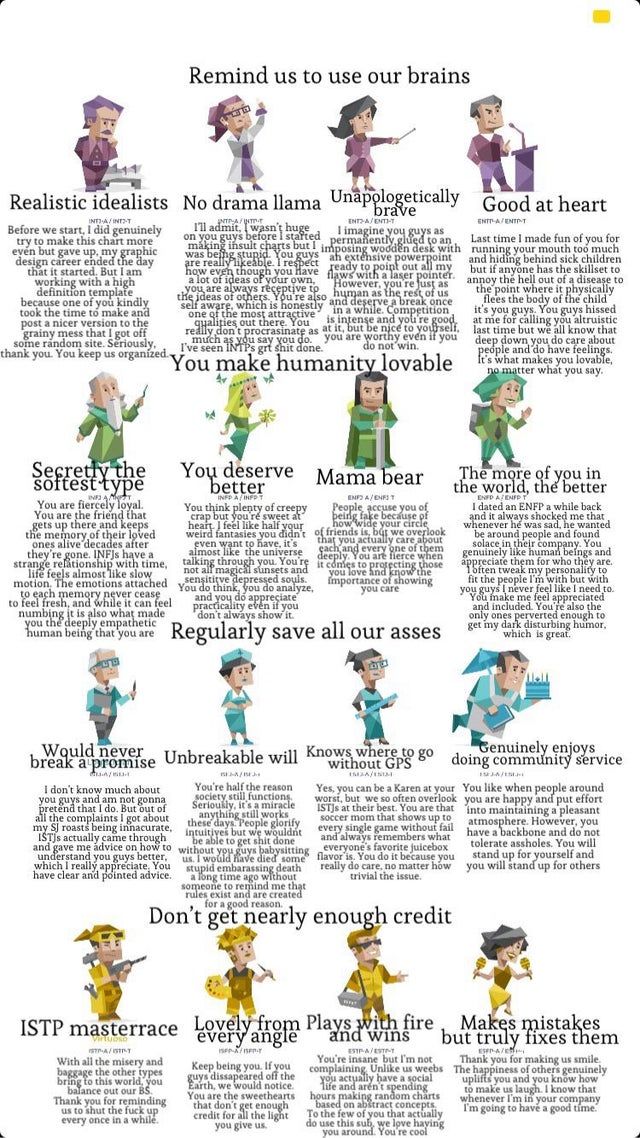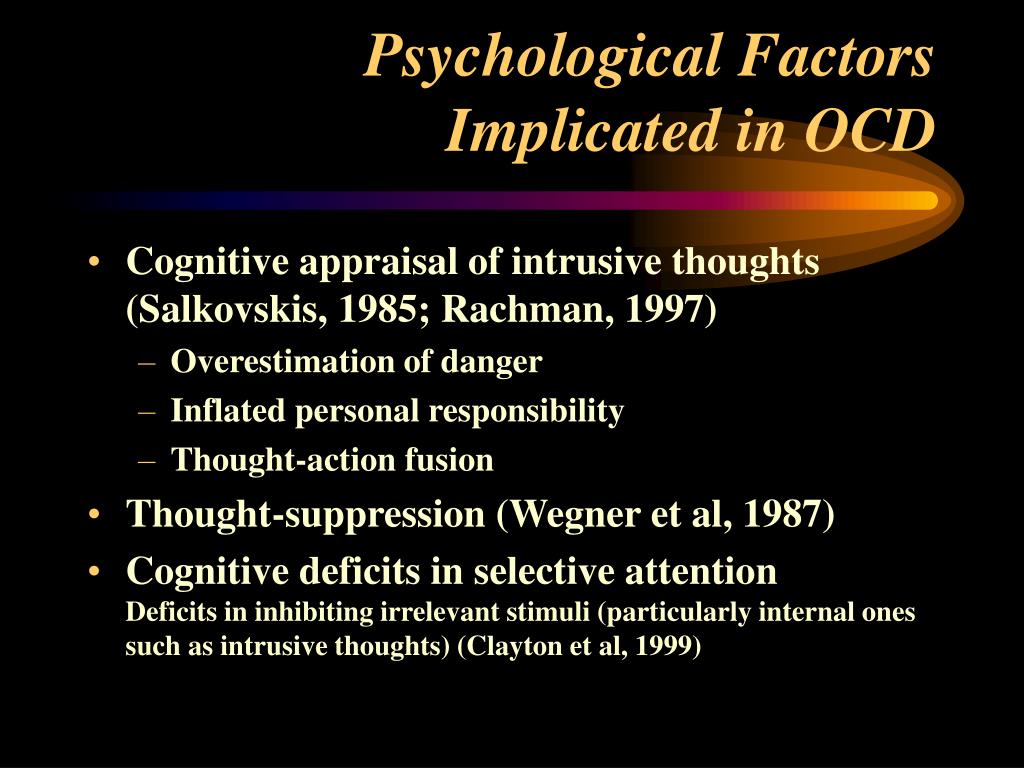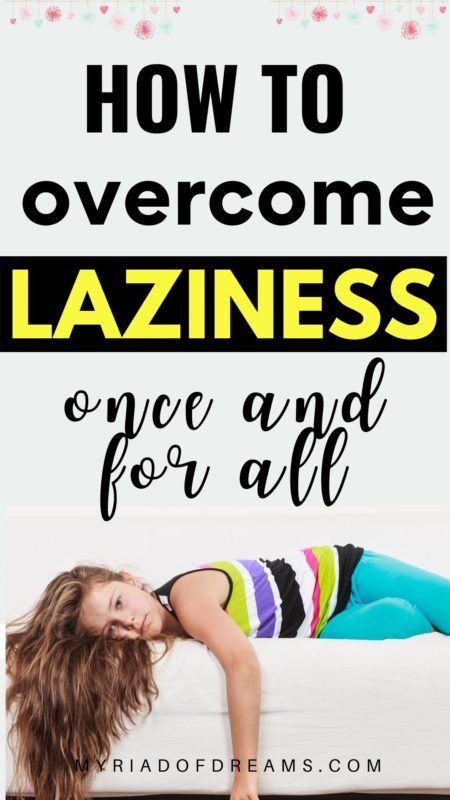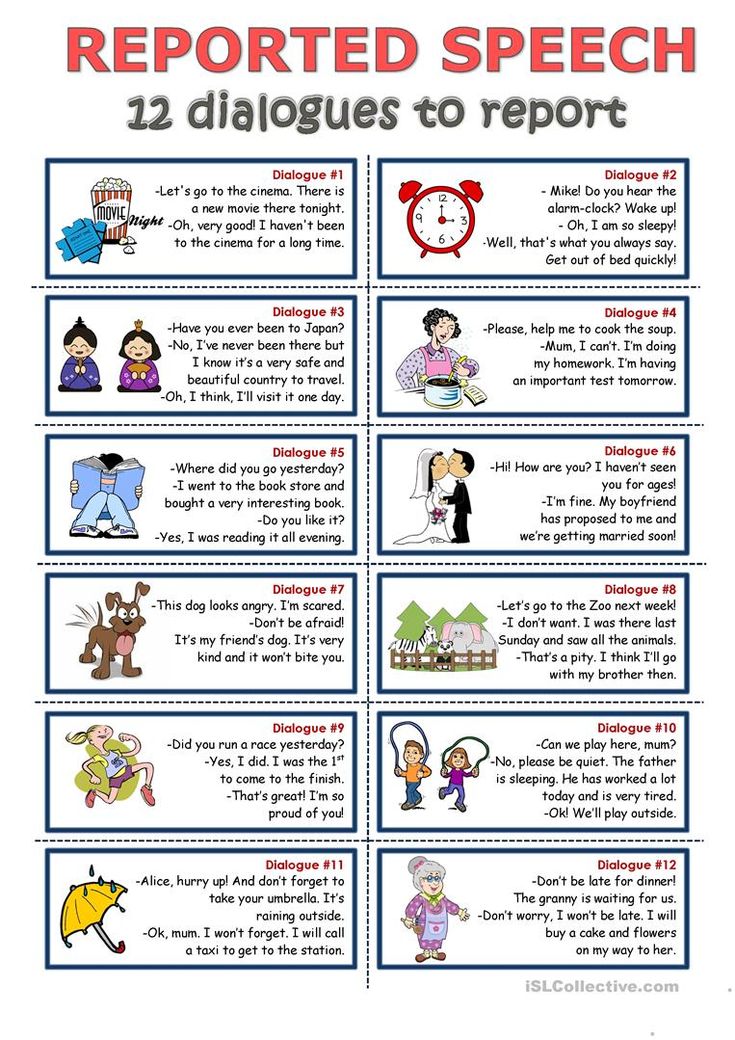Cool tests personality
12 fun personality tests to get to know your colleagues
List of top fun personality tests
- Myers Briggs Personality Test (MBTI)
- Enneagram Tests
- DISC
- Berkeley Emotional Intelligence Quiz
- Caliper Profile
- The High 5 Test
- 16 personality
- HEXACO
- John’s Personality Test
- SHL Occupational Personality Questionnaire
- Eysenck Personality Inventory
- Emotional Intelligence Test
Personality tests are a great way for employers to gain insights about their employees — their way of thinking, traits, skills, motivation, and preferences.
Employers use them in the pre-employment stage, as well as job candidates themselves, to figure out the best job for them and their career paths.
A personality test is also an excellent opportunity for team building and in improving employee engagement and motivation.
These fun personality tests have become a practice in the working environment for the past decade. In fact, 80% of Fortune 500 and 89% of Fortune 100 companies have used the Myers-Briggs Type Indicator (MBTI).
That being said, due to numerous personality tests available, choosing the right tests for teams is quite a challenge.
This article will discuss personality tests are, their role in the workplace, including the list of best fun personality tests that employers can use in teams.
List of top fun personality testsWhat is a personality test?
Personality tests are the assessment that determines the personality or traits of a person. More specifically, it shows a person’s psychological preferences, character, temperament, and beliefs.
Besides the workplace, these tests are also used in various settings. Mental health professionals make use of personality tests for diagnoses.
In most working environments, these fun personality tests play a significant role in the success of the day-to-day operations of a particular organization.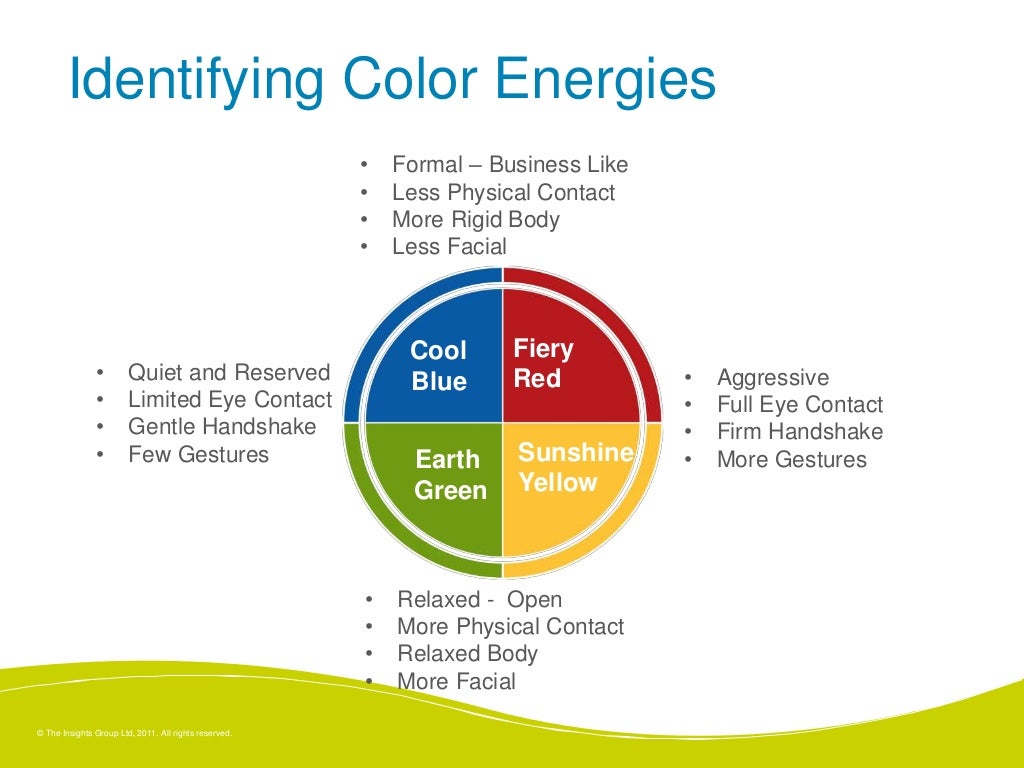
Employers use these assessments for screening candidates that fit their company, team building, and in optimizing employees management approaches.
What is a personality test?What do personality tests tell you?
Simply put, personality tests make individuals aware of their thinking process. The results give insights into peoples’ behaviors, skills, attitudes, values, and preferences.
Not all personality tests are 100% accurate since they involve many factors. All in all, personality tests are guides to knowing a person’s strengths, weaknesses and communication style that help build connections with people — especially with colleagues.
Top 12 fun personality tests
1. Myers Briggs Personality Test (MBTI)
Myers Briggs Personality Test (MBTI) was developed by Isabel Briggs Myers and her mother, Katharine Briggs.
It is a type of personality test that gives descriptions of one’s personal tendencies as they relate to the acronym. This acronym shows psychological preferences based on the four categories;
- Extraversion (E) vs Introversion (I)
- Sensing (S) vs Intuition (N)
- Thinking (T) vs Feeling (F)
- Judging (J) vs Perceiving (P)
The result resembles a code with four letters;
- ISTJ – Inspector
- ISTP – Crafter
- ISFJ – Protector
- ISFP – Artist
- INFJ – Advocate
- INFP – Mediator
- INTJ – Architect
- INTP – Thinker
- ESTP – Persuader
- ESTJ – Director
- ESFP – Performer
- ESFJ – Caregiver
- ENFP – Champion
- ENFJ – Giver
- ENTP – Debater
- ENTJ – Commander
MBTI is quite similar to the 16 Personalities test or the Jung Typology test.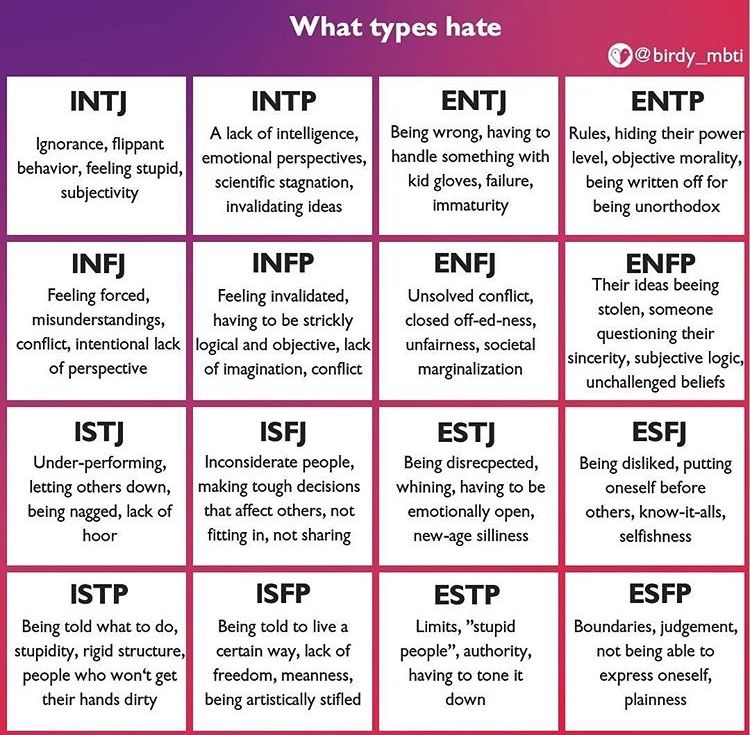 With 93 questions in all, the results can highlight which employees collaborate most effectively and who are fit for the company’s culture.
With 93 questions in all, the results can highlight which employees collaborate most effectively and who are fit for the company’s culture.
2. Enneagram Tests
Enneagram Test is a personality test that tells human-specific traits based on the nine major personality types:
- Type 1: The Reformer/Perfectionist
- Type 2: The Helper/Giver
- Type 3: The Achiever/Performer
- Type 4: The Individualist/Romantic
- Type 5: The Investigator/Observer
- Type 6: The Loyalist/Loya Skeptic
- Type 7: The Enthusiast/Epicure
- Type 8: The Challenger/Protector
- Type 9: The Peacemaker/Mediator
These nine personality types are so-called “wings”. For instance, if someone’s personality profile suggests that they may be predominantly a type 3 (Achiever), they may share some qualities commonly found in type 4 (Individualist) and/or even 5 (Investigator).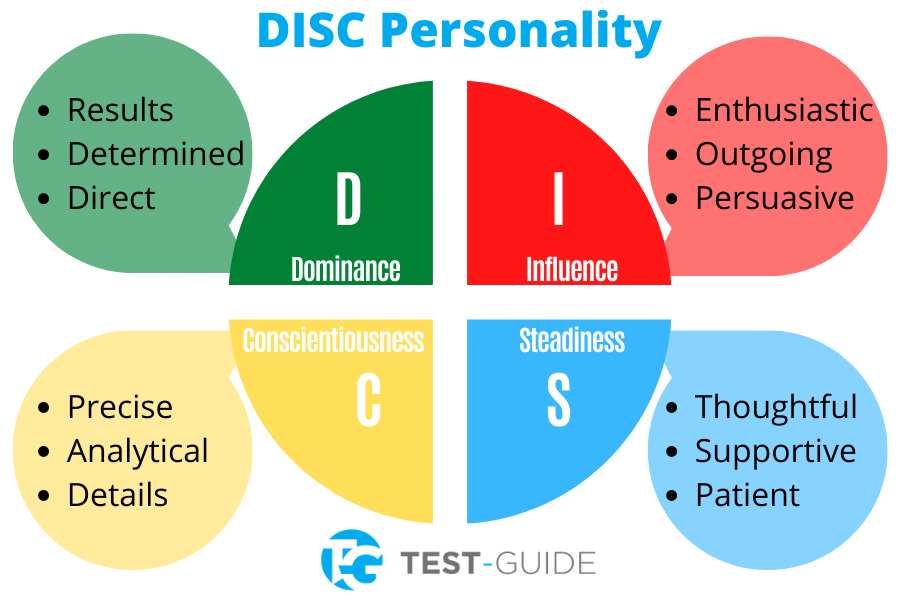
3. DISC
DISC is a 28-question assessment with four categories —dominance, influence, steadiness, and conscientiousness.
Its questions are based on social situations, asking respondents to rate whether the statement is accurate or choosing the word that most represents them.
DISC can highlight an individual’s interpersonal style, and it can help companies with their conflict management and improving communication.
4. Berkeley Emotional Intelligence Quiz
It was designed by The Greater Good Science Center at the University of California, Berkeley. This test is more like a visual assessment that can be used in workplace environments.
Instead of lengthy questions, Berkeley Emotional Intelligence Quiz presents respondents with photographs and asks them to choose from four possible emotions.
For instance, through this test, employers will understand a team’s body language and expressions, especially in meetings.
Berkeley Emotional Intelligence Quiz5.
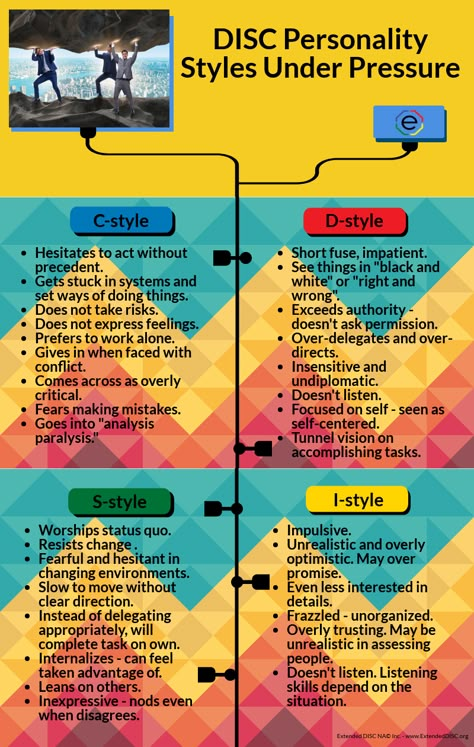 Caliper Profile
Caliper ProfileCaliper Profile is developed by an Australian-based company that has worked with over 30,000 businesses worldwide. It gives insights into a person’s potentially positive as well as negative qualities.
It is a 180 multiple choice question that measures a person’s compatibility for specific roles. It presents questions that ask respondents that align with their views.
This type of personality test is used by a lot of organizations for candidate screenings and for employee promotion.
6. High 5 Test
The High 5 Test is a strength assessment that determines a person’s top five dominant traits through 100 prompts.
Respondents will rate each statement applied on a scale from 0% to 100% in terms of strongly agree to strongly disagree.
This is one of the fun personality tests that companies often use for team building, coaching, leadership, and personal development.
7. 16 personality
16 Personality Factor Questionnaire is often referred to as 16PF.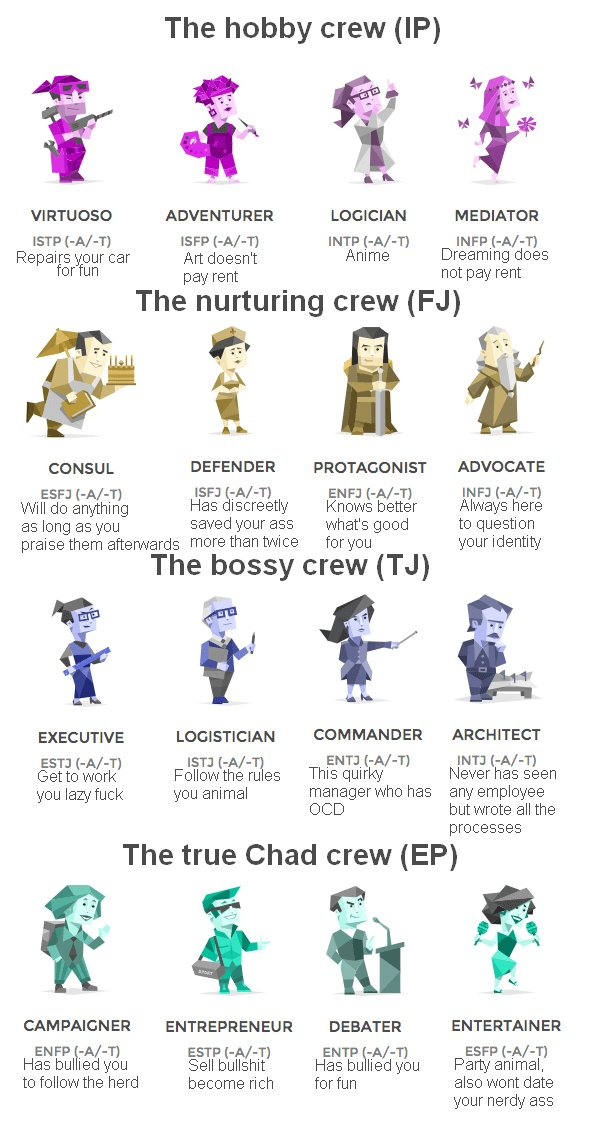 It is a type of test that measures a person’s emotional stability, sensitivity, dominance, self-reliance, rule-consciousness, perfectionism, and openness.
It is a type of test that measures a person’s emotional stability, sensitivity, dominance, self-reliance, rule-consciousness, perfectionism, and openness.
This test helps organizations to determine employee behaviors, including their progress and career development. The respondents answer the extent to which statement they agree or disagree with.
8. HEXACO
HEXACO is a personality test that assesses various dimensions of one’s personality and how one will apply these theoretical interpretations to different situations.
The model measures key dimensions, including honesty/humility, emotionality, extraversion, agreeableness, conscientiousness, and openness to experience.
The assessment is comprised of 200 questions (full-length assessment), 100 questions (half-length assessment) or 60 questions (HEXACO 60).
9. John’s Personality Test
John’s Personality Test is an assessment with results based on Myers-Briggs Indicator. It is comprised of 25 questions, and it only considers five personality types such as ISFJ, ISTJ, ISFP, ESFJ, and INFJ.
This is among the fun personality tests that allows respondents to conclude similarities and differences between other personality types.
With this, John’s Personality Test can be used in employment screening, and it gives an insight into whether the new hire is compatible with the rest of the team.
10. SHL Occupational Personality Questionnaire
The SHL Occupational Personality Questionnaire is also called OPQ32. It has 104 questions designed to give employers insights about how their employee’s personality traits and behaviors influence their performance at work.
This test measures 32 characteristics, and it is categorized into three main areas; thinking style & feelings, emotions, and relationships with people.
The results significantly help employers with reports that can be used to compare job applicants to one another.
11. Eysenck Personality Inventory
Eysenck Personality Inventory was developed by two psychologists, Sybil B.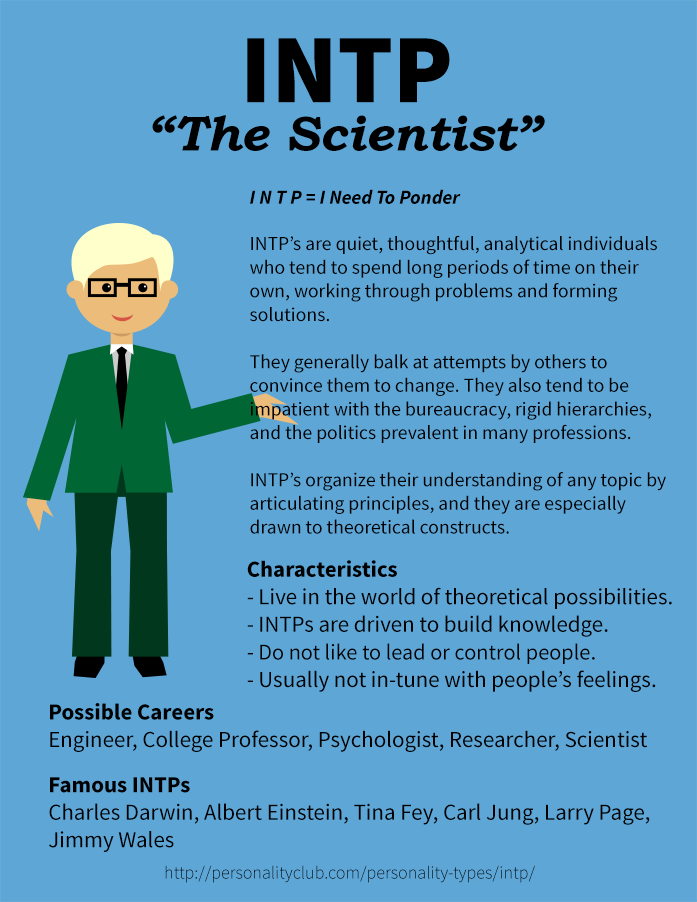 G. Eysenck and Hans Jürgen Eysenck. It is a test that assesses an individual’s personality based on two categories:
G. Eysenck and Hans Jürgen Eysenck. It is a test that assesses an individual’s personality based on two categories:
- Neuroticism and stability
- Extroversion and introversion
What makes Eysenck Personality Inventory different from other tests is that it includes a “lie score.” This measures a person’s honesty in answering the test.
12. Emotional Intelligence Test
Emotional Intelligence Test is a short test that measures individuals’ EQ level. Thus, this test will help them understand their own emotions as well as the emotions of others.
The results are based on the four quadrants:
- Self-Awareness
- Self-Management
- Relationship Management
- Social-Awareness
Emotional Intelligence Test is a great tool in the workplace as it will reveal employees’ emotional intelligence that might affect how they emphasize one another.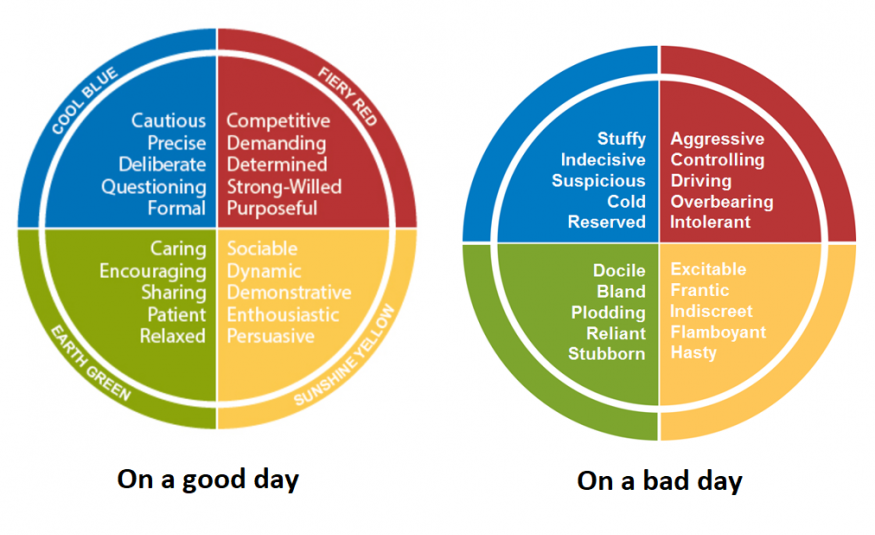
Why are personality tests useful in the workplace?
These may be simple, fun personality tests for some, but this personality tests significantly help employers for a wide range of reasons.
From employee screening process to promotion to self-assessment, personality tests help people figure out whether that person is best suited for the role and to company culture.
Simply put, knowing your colleagues’ personalities makes work efficient, which creates more productive and happier teams.
14 Free Online Personality Tests to Figure Yourself Out
What's the best job for you?
Use The Muse to find a job at a company with a culture you love. Select the career path that aligns with you:
Marketing
Sales
Data
Human Resources
Customer Service
Software Engineering
Product Management
Education
Design and UX
Administration
How many years of experience do you have?
0 - 1 years
1 - 5 years
5 - 10+ years
What company benefits are most important to you?
Health Insurance
Paid Vacation
Remote Work Opportunities
Dental Insurance
401k With Matching
Vision Insurance
Promote From Within
Flexible Work Hours
Personal Sick Days
Performance Bonus
Calculating your job matches.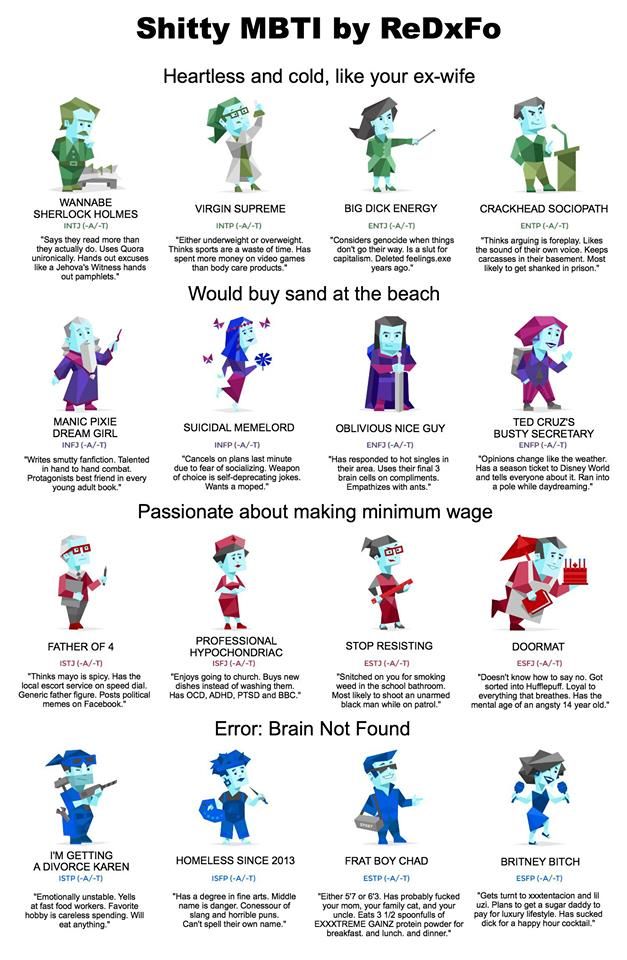 ..
..
I’m sensitive, but strong-minded!
I’m destined to marry rich!
Alright, that last one’s my horoscope, but the others are results of personality quizzes. There’s something wonderful about personality tests—the idea that you can put yourself into a category (or categories), just like that, is so relieving and satisfying.
And while we can understand that these quizzes will not be completely accurate, a lot of them do provide us with some insight into who we are, how we act, what our potential is, and where our ambition might take us. The more you know and understand about yourself, the more likely you are to find a career path you’ll love.
So if you’re looking for some great personality quizzes—or even just something fun to do over lunch, keep scrolling.
Based on Carl Gustav Jung’s study of psychological traits (for example, introversion and extroversion) and the famous Myers-Briggs test, 16 Personalities covers the “big five” personality traits of individuals: mind, energy, nature, tactics, and identity.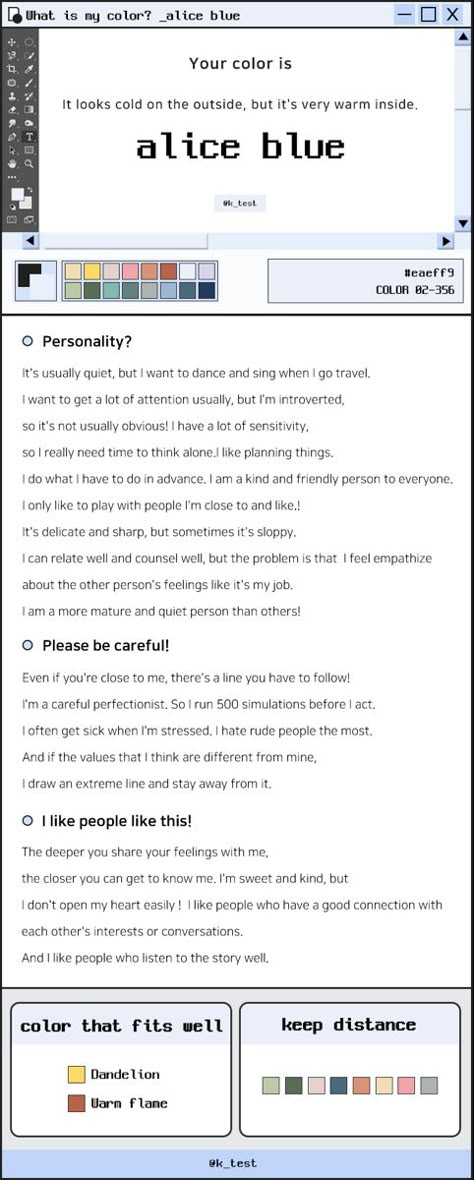 As one of the most popular personality quizzes online—taken more than 500 million times—it’ll cover everything from your basic qualities to your romantic relationships to your workplace habits, strengths, and weaknesses.
As one of the most popular personality quizzes online—taken more than 500 million times—it’ll cover everything from your basic qualities to your romantic relationships to your workplace habits, strengths, and weaknesses.
The “Who Am I?” Visual DNA test is one of the most fun personality quizzes you’ll come across. Formatted less like a Q&A setup and more like a “pick a photo that you think is pretty” system, it’ll show how your character defines your outlook on and approach to life.
The HEXACO PI-R measures six major dimensions of personality: Honesty and humility, Emotionality, eXtraversion, Agreeableness, Conscientiousness, and Openness to experiences. You’ll rate how much you agree or disagree with 100 different statements and as a result, gain some insight into how you relate to other people and react to different kinds of scenarios.
An IQ test is typically something you have to pay for and have professionally administered to get a truly accurate score (and even then it only measures one specific type of intelligence).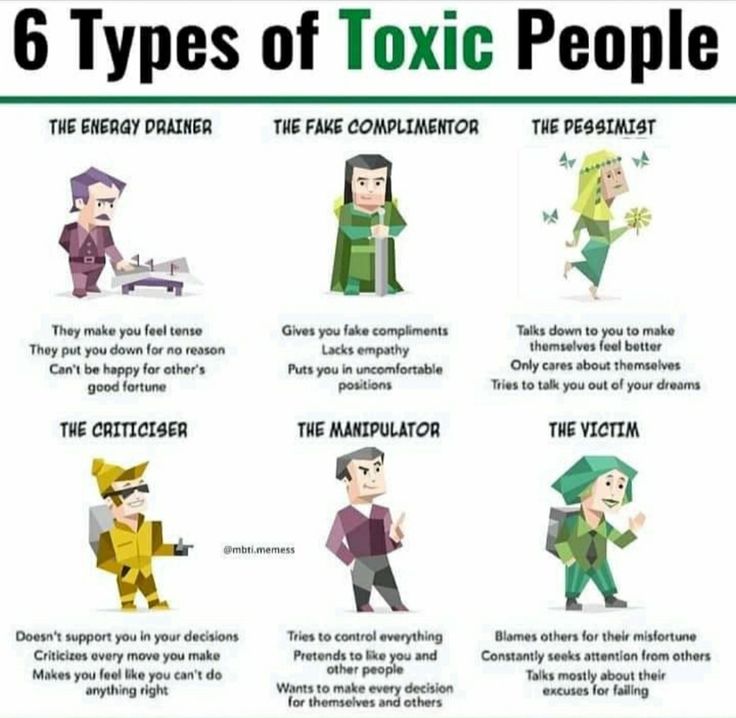 But there are some great, free resources out there like 123test. Their free IQ tests are just shortened versions of the real deal and they even have a “culture fair” test which is great if English isn’t your first language.
But there are some great, free resources out there like 123test. Their free IQ tests are just shortened versions of the real deal and they even have a “culture fair” test which is great if English isn’t your first language.
If you think you’re smart enough to join the prestigious and oldest high-IQ society, Mensa International, take this free exam and try to score in the 98 percentile. Then, you might consider taking their official test and if you ace that, it’s off to have some intellectual conversations!
Emotional intelligence is just as important as IQ—in and out of the office. EQ is the ability to process and manage your own emotions, as well as understand and influence the emotions of others. IHHP asks short, straightforward questions about how you act around others and how you handle certain situations. It’ll not only tell you where your emotional intelligence (EQ) currently is, but also suggest ways to improve weak areas.
This test is inspired by Daniel Goleman, psychologist and science journalist who wrote for The New York Times, as well as author of Emotional Intelligence: Why It Can Matter More Than IQ, a book discussing the many reasons why EQ shapes who we are.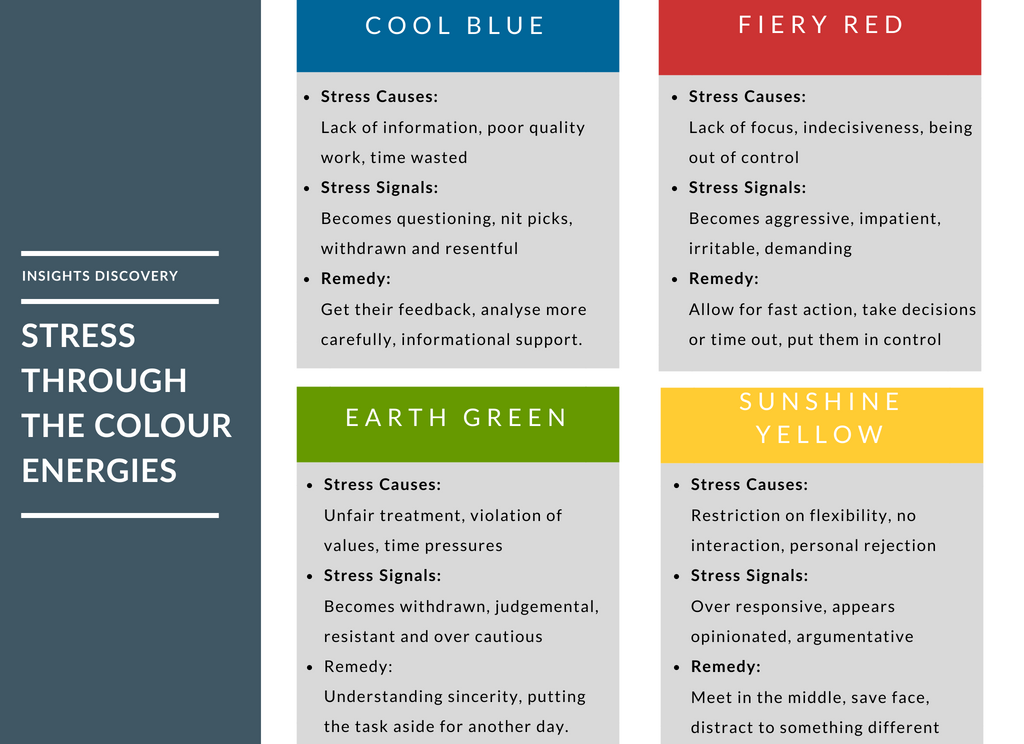 Instead of being direct, this quiz presents stories and asks you to answer how you’d normally respond in those circumstances.
Instead of being direct, this quiz presents stories and asks you to answer how you’d normally respond in those circumstances.
Skills You Need covers four major components of interpersonal skills: listening, verbal communication, EQ, and teamwork. Your answers will determine if you’re above, at, or below average, and give you some direction on how to better interact with others.
This awesome, in-depth assessment takes you through various career situations, gauging both your skill level and interest. Then, it provides you with several options for your ultimate career. (OK, it might not know you perfectly, but you may enjoy knowing which jobs you could totally pull off.)
Do you know what your “dream job” even is? Let BuzzFeed decide for you—based on what outfit you put together. (Obviously, you shouldn’t take this one too seriously.)
If you’ve dreamed about going to Hogwarts your whole life (childhood and adulthood, I won’t judge), now’s your chance to know which house you truly belong in—and maybe learn a bit more about your personality along the way.
Just by choosing your favorite and least favorite colors (yup, that’s it), this test will tell you about your leadership, your management skills, your imagination, and more. But keep in mind, you’re just picking colors from a limited (and kind of ugly) selection here—so this one’s more for fun than it is an accurate assessment of who you are as an individual.
You’ve likely seen a “which character are you?” quiz for everything from Jane Austen novels to the Marvel Cinematic Universe to Mean Girls—but what if you could take all those quizzes at once? This quiz draws on a crowd-sourced database of the personality traits of more than 2,000 characters across film, television, and literature, so you can see which fictional character you’re most like. Or, after you take the test, you can filter your results by individual properties and scroll through your top characters for all your favorites.
Aesthetic can be hard to define, but this BuzzFeed quiz—that’s been taken more than one million times—makes it easy.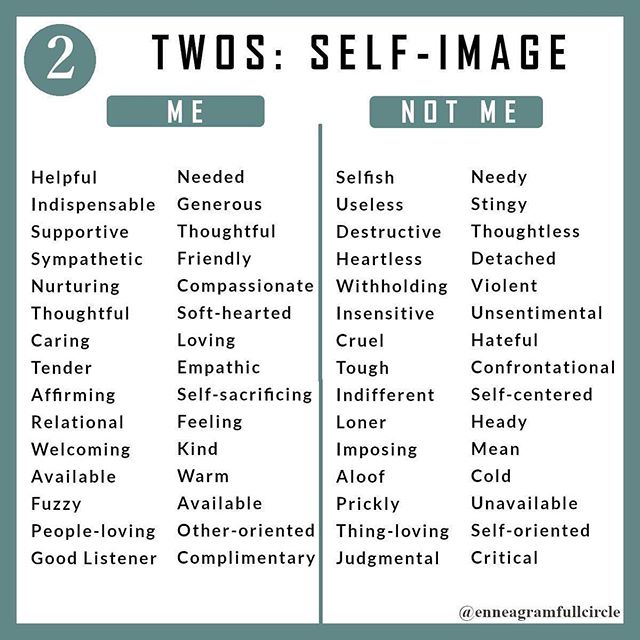 While your external aesthetic revolves more around your fashion and design preferences, your inner aesthetic is more about your personality. Find out if your personality aligns with an aesthetic like cottagecore, dark academia, or something else.
While your external aesthetic revolves more around your fashion and design preferences, your inner aesthetic is more about your personality. Find out if your personality aligns with an aesthetic like cottagecore, dark academia, or something else.
If you were wondering, I’m ENFJ, I have high emotional intelligence, and I’d be in Hufflepuff (go badgers!). What’d you learn?
Regina Borsellino contributed writing, reporting, and/or advice to this article.
Previously an editor for The Muse, Alyse is proud to prove that yes, English majors can change the world. She’s written almost 500 articles for The Muse on anything from productivity tips to cover letters to bad bosses to cool career changers, many of which have been featured in Fast Company, Forbes, Inc., CNBC's Make It, USA Today College, Lifehacker, Mashable, and more. She calls many places home, including Illinois where she grew up and the small town of Hamilton where she attended Colgate University, but she was born to be a New Yorker.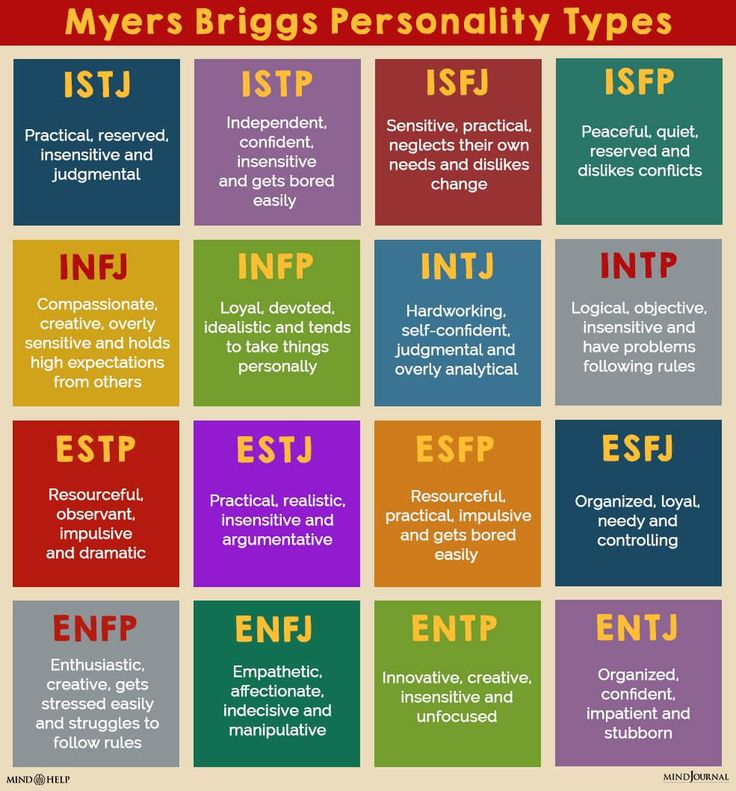 In addition to being an avid writer and reader, Alyse loves to dance, both professionally and while waiting for the subway.
In addition to being an avid writer and reader, Alyse loves to dance, both professionally and while waiting for the subway.
10 psychological tests to help you get to know yourself better
March 12, 2021 Education
Questionnaires to test intelligence, anxiety levels, conflict levels and more.
1. Raven IQ test
This test will help you determine how smart, quick-witted and logical you are. It consists of 60 tasks, the complexity of which gradually increases.
Each question is a picture with symbols or shapes connected to each other. Your task is to understand how they are located, and then insert the missing element into the image.
Pass the test →
2. SMIL test
This questionnaire will be useful to make your comprehensive psychological portrait. You will be able to find out the type of personality, dominant character traits, communication style, propensity to take risks, level of self-esteem .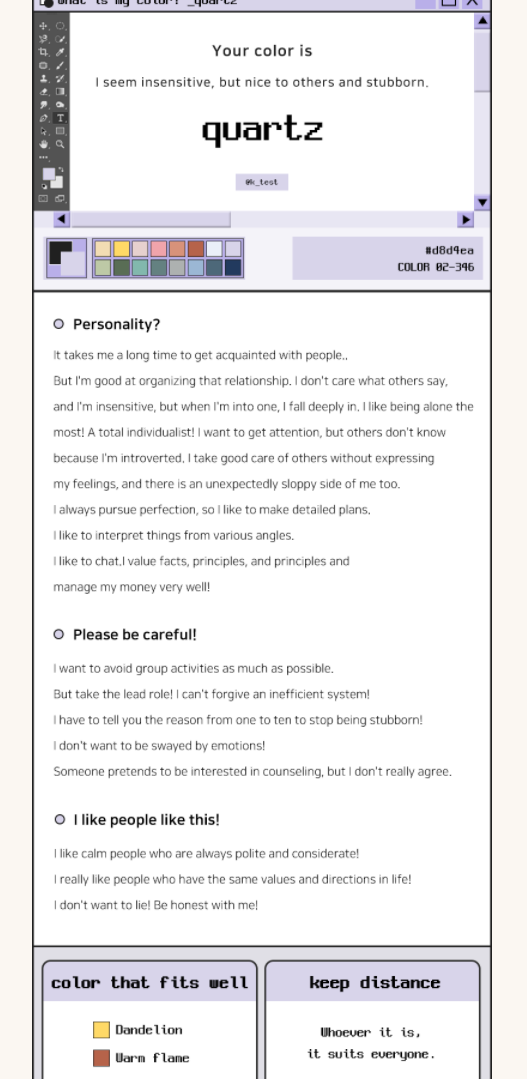 .. And that's not all!
.. And that's not all!
True, to get the coveted result, you have to work hard: the full version of the test consists of 567 statements. You will have to choose whether you agree with them or not. But there is also an abbreviated version for express diagnostics of 65 questions.
Take the full test →
Take the short test →
3. Thomas-Kilmann test
Find out how prone you are to conflict and how you behave when things get heated around you. Check which style of disagreement resolution suits you best: confrontation, compromise, or silence.
The questionnaire consists of 30 pairs of statements. In each question, you will need to choose the answer that most accurately characterizes your behavior.
Take the test →
4. Test "House, tree, person"
Drawings of a person can tell a lot about his inner world. Check it out for yourself: draw a house, a tree and a person on paper, and then find out what it all means.
After interpreting the results, you will receive information about what lies in your subconscious, how comfortable you feel in society, what worries you and other interesting data.
Take the test →
5. Interpersonal Relationship Questionnaire
This test will help you determine your level of socialization. Check how easy it is for you to get close to people, how much they influence you, and how great your need for communication and attention is in general.
Be as honest as possible when taking the test. Answer the way you really think, not the way others expect you to. Then the results will be more reliable.
Take the test →
6. Activity style questionnaire
Activity style is the means and techniques by which a person achieves the set results. Answer questions about your temperament, character and interests, and then find out if you are an activist, thinker, theorist or pragmatist.
After passing the test, you will receive a detailed description of your type, and also find out what can reduce and increase your effectiveness in achieving your goals.
Take the test →
7. Taylor Anxiety Scale
Sometimes healthy anxiety can be helpful.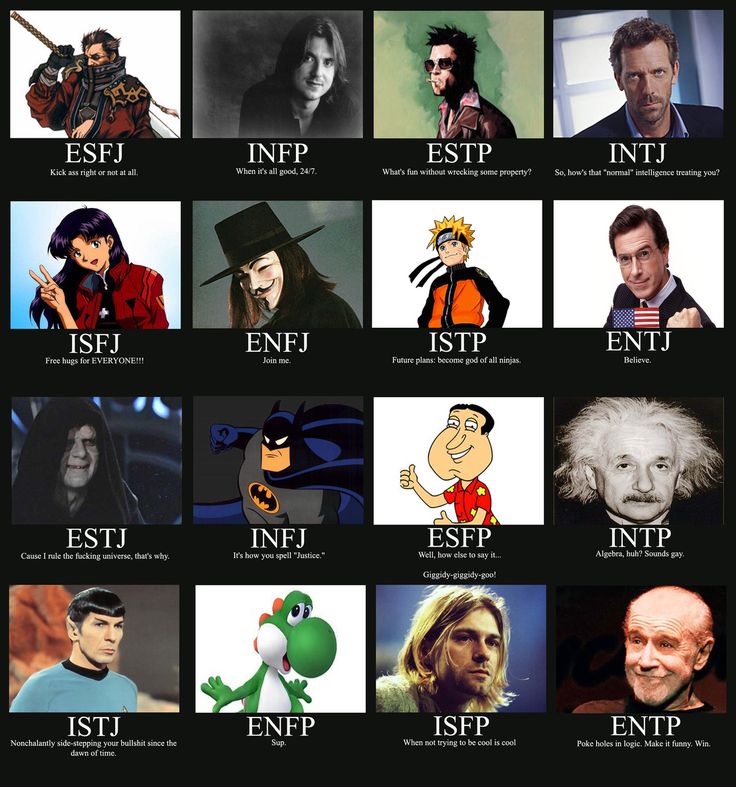 It helps to be more attentive and more careful in unforeseen situations. But if anxiety arises for no reason and exceeds reasonable limits, it greatly complicates life. The test will help you find out if you are prone to this disorder.
It helps to be more attentive and more careful in unforeseen situations. But if anxiety arises for no reason and exceeds reasonable limits, it greatly complicates life. The test will help you find out if you are prone to this disorder.
Take the test →
8. Boyko test for diagnosing burnout
Fatigue, irritability, poor sleep and inability to concentrate on the task at hand are true companions of emotional burnout. If you find yourself experiencing at least some of these symptoms, take the test and see if it's time for you to take a vacation and have a good rest.
Take the test →
9. Test of meaningful life orientations
This short survey will help determine the overall level of meaningfulness in your life. It will show how productive, rational and eventful the already lived part of it is, and will also make it clear what are your chances for a happy bright future.
Take the test →
10. Diagnosis of irrational attitudes
Each of us has certain attitudes from childhood that sometimes prevent us from adequately perceiving reality.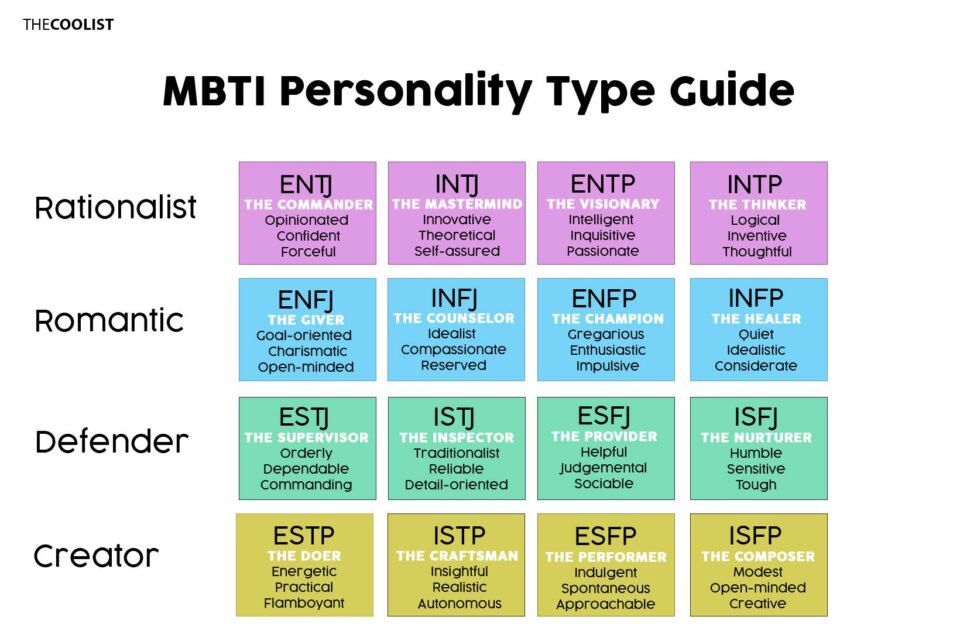 With this test, you can find out what negative biases you have, how they affect your worldview and what to do to get rid of them.
With this test, you can find out what negative biases you have, how they affect your worldview and what to do to get rid of them.
Take the test →
Read also 🔥
- 0083
- QUIZ: Answer 4 short questions and find out your personality type
- 4-question test: Find out your character by crossing your arms
10 coolest association tests The coolest of these are the much-loved association tests.
Associative tests are specially designed tasks with which you can learn a lot about yourself. They are based on our ability to somehow interpret the cognitive constructions connected in our minds. The method of associative tests is widely used by psychologists to reveal the personality of the subject.
Perhaps these are the most amazing and interesting psychological tests that absolutely everyone loves. Notagram.ru specifically found the best of them on the Internet. How to pass them? The first thing to do is to relax as much as possible.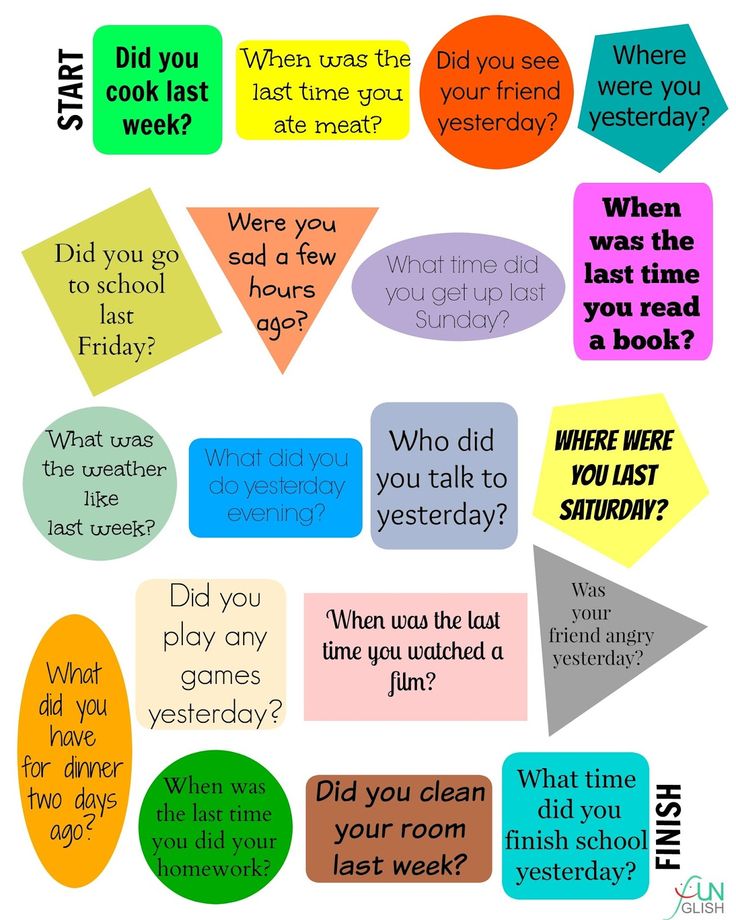 Then use your imagination as much as possible and write associations on a piece of paper.
Then use your imagination as much as possible and write associations on a piece of paper.
4 Doors Association Test
Imagine that you are in a dimly lit and mysterious corridor. In the semi-darkness you go forward in search of a way out. And suddenly four doors appear in front of you, painted in different colors.
Questions:
1. The first door is green. You open it, behind it is a room. You go inside. Look around. What is this room? Describe what it looks like and what's inside. How do you feel when you are in this room? Memorize the items, remember your thoughts and go back to the corridor.
2. Blue second door. Open it. Check out the room behind it. Room size, furnishings. Are you comfortable here? What do you feel and think. Remember and come back, continuing your way.
3. The third door is red. Come in. What was behind the door? Which room? Do you want to stay here? What feelings do you visit inside this room?
4.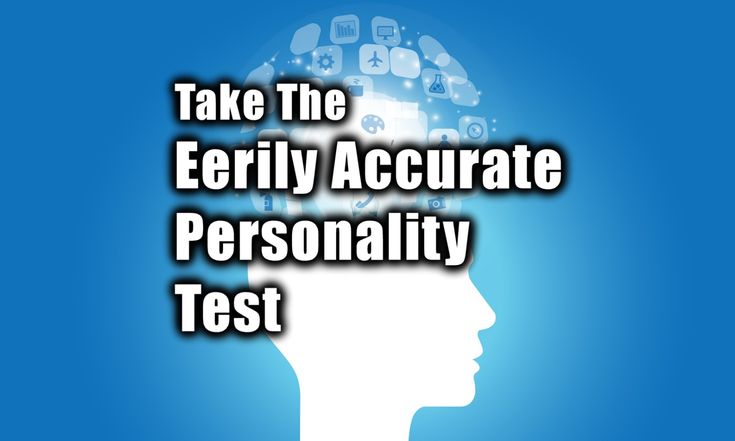 Black last door. Opening it, you see the fourth room. Go into it. What kind of place is it? What do you see. What do you feel being here?
Black last door. Opening it, you see the fourth room. Go into it. What kind of place is it? What do you see. What do you feel being here?
Now return to the real world and remember everything you saw in order and in detail. When describing rooms, furnishings and interior items, do not forget that the main thing is your feelings. Which room did you feel most comfortable in? Which room did you like best? Was it more comfortable and beautiful? And in which, maybe, you became scared and unpleasant, and you wanted to get out as quickly as possible. Which room was bright and which was dark? Where reigned warmth, and where is disorder? Make note of any important details. And move on to interpreting the answers.
1. In psychology, green symbolizes childhood. When you enter the room behind the green door, you find yourself in your childhood. What did you feel about it? If you were pleasant and comfortable, then your childhood was also a pleasant and bright time for you.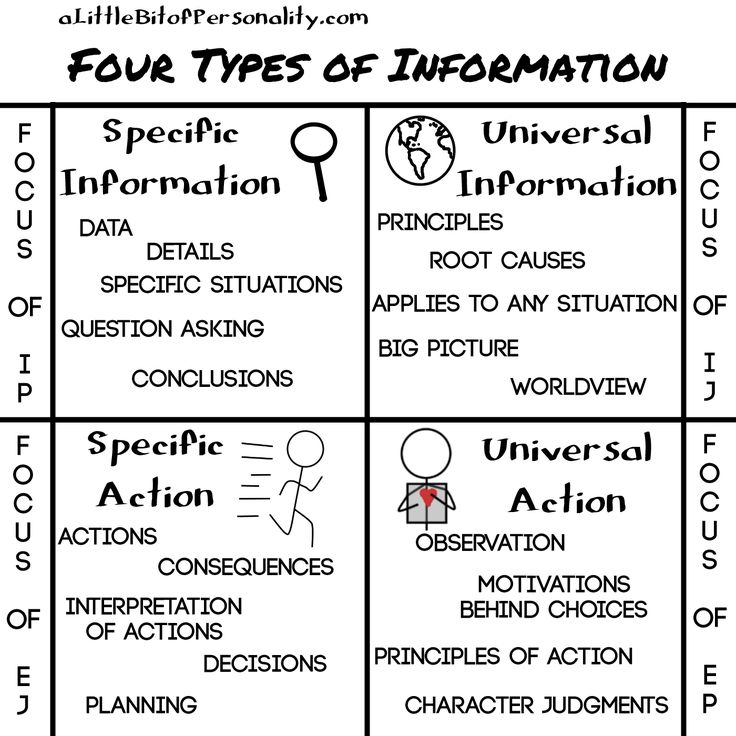 If you wanted to stay in this room for a long time, then most likely you often return to your childhood in your thoughts and, perhaps, you miss that warm and sincere time, care and participation from other people in your adult life. Any negative thoughts and feelings that have arisen in this room indicate unresolved childhood problems that affect your entire future life. Normally, the room should be nice and cozy, but should not cause much desire to stay in it, because the curiosity to visit other doors should be stronger.
If you wanted to stay in this room for a long time, then most likely you often return to your childhood in your thoughts and, perhaps, you miss that warm and sincere time, care and participation from other people in your adult life. Any negative thoughts and feelings that have arisen in this room indicate unresolved childhood problems that affect your entire future life. Normally, the room should be nice and cozy, but should not cause much desire to stay in it, because the curiosity to visit other doors should be stronger.
2. The second room behind the blue door symbolizes your state of mind at the moment, at this very minute, when you are taking this test. Your feelings will tell you how you feel right now. Comfortable or uncomfortable in this room. Are you satisfied with your current life situation or you have a desire to change it. There was order or disorder in the room - characterizes you as a collected, organized person or, conversely, chaotic and impulsive. Is the room empty or filled with a wide variety of objects? Etc.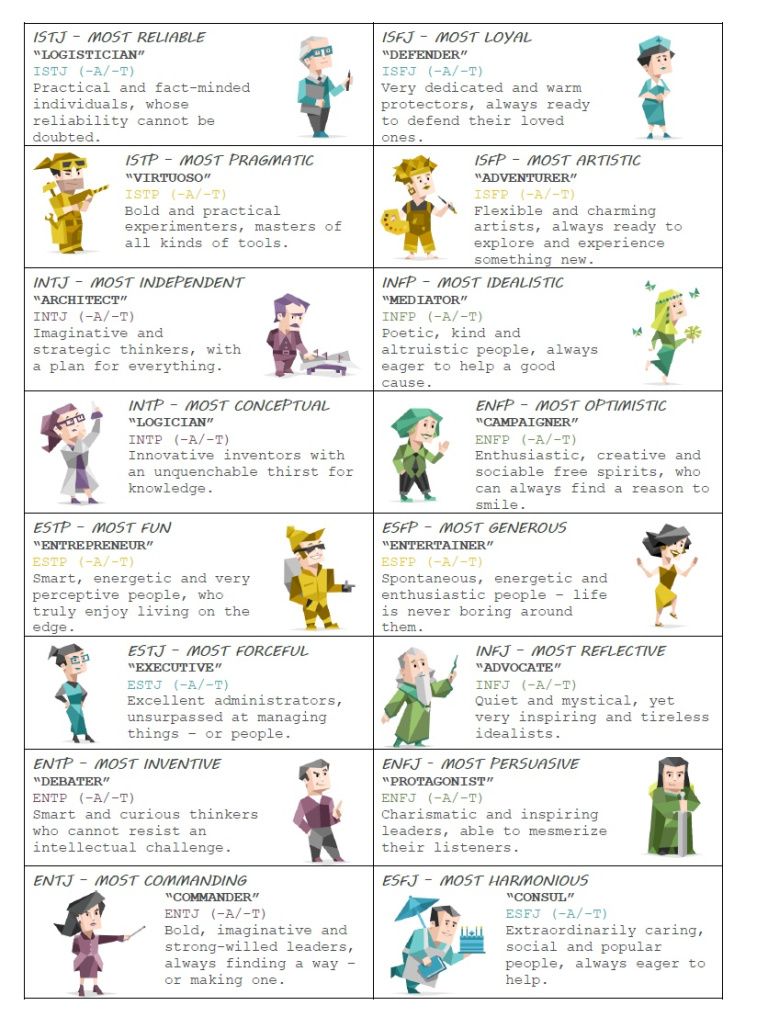
3. The third red door and the room behind it symbolizes sensual love and your attitude towards it. Large spacious room - you tend to experience strong feelings. A small room is a constrained, timid in the manifestation of feelings, a person. Light - your love experiences are light, airy, romantic. Dark - love feelings make you suffer. Cozy or uncomfortable - will tell you whether you are comfortable in love or maybe you have recently experienced disappointment in love. Bright or dull colors in the room. What kind of items: everyday, ordinary or exclusive works of art.
4. The black door and the room behind it symbolizes your attitude to professional activity, work and business. What was this room? Was there order and everything was in its place, or was the room littered with various unnecessary things? Did you navigate this room well or were you completely confused? Spacious or small - will tell you about the possibilities of applying your professional knowledge and
skills.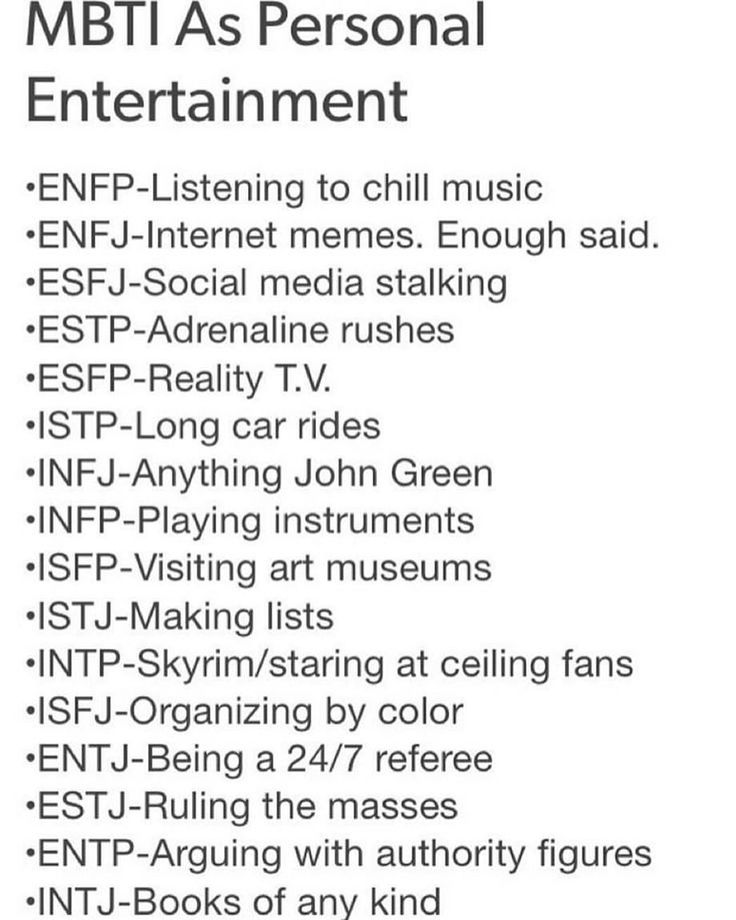 If you were comfortable in this room, then in your professional life, you feel safe and seem to be in the right place.
If you were comfortable in this room, then in your professional life, you feel safe and seem to be in the right place.
Singer/Singer Association Test
Imagine that you are a star and you are about to perform. You have to sing live. You go on stage, you are met by a huge number of fans and spectators and suddenly you realize that you cannot sing (no voice). Music plays - you are silent. The audience begins to understand that something is wrong, a wave of indignation gradually grows in the hall, someone is shouting something, someone is trying to break into the stage.
Questions:
What do you hear from the audience? An indistinct hum or quite distinct individual cries? If specific screams, what words/phrases do you hear?
Someone is trying to break into the stage. Who is this? A man, a woman, or several people at once?
Does he/she/they manage to get on stage with you? If so, what are the actions of this person/these people? Shouts, insults, or maybe attempts to hit you or a silent look at you, into your eyes?
What are you doing? Will you try to reassure the audience, explain what the matter is, or quickly run away from the stage without explaining the reasons?
The answers to this test will show you what you fear in life.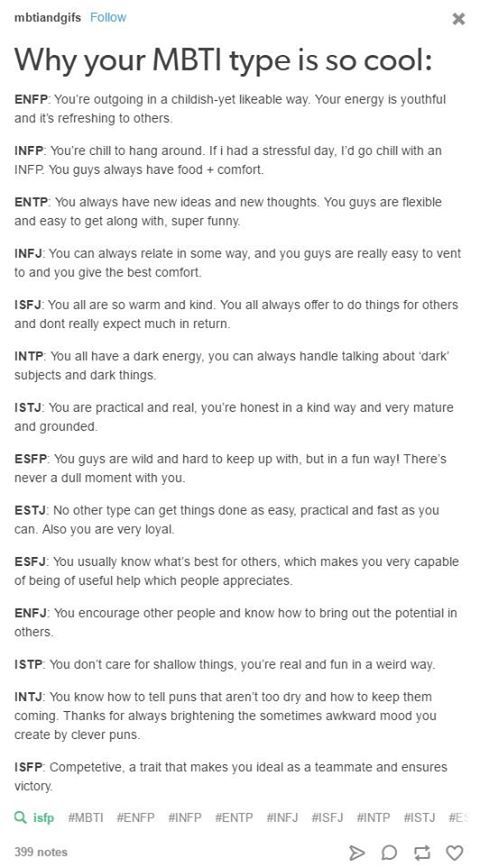
What you hear from the audience is an image of your fear. An obscure noise and hum means that your fear is not specific, perhaps of a mystical nature. And vice versa, the more distinct the cries, the more definite and specific your fears. Phrases and words that you can distinguish help you figure out what exactly you are afraid of
Man - fear is caused by a man. Woman - the threat comes from a woman. A few people - the crowd causes fear. No one manages to break into the stage - your fear is not related to people.
Attempts to hit - you are afraid of physical pain, injury and damage. Shouts, insults, a silent inquisitive look - your answer shows exactly what you are afraid of.
If you run away, it means that you cannot cope with your fears and overcome them. The longer and more effective you try to explain with the audience, the more successfully you fight and are able to cope with your fears.
Associative Test "Flying Object"
You are walking down the street and onto the road, onto the roadway, right in front of you some kind of flying object is descending from the sky.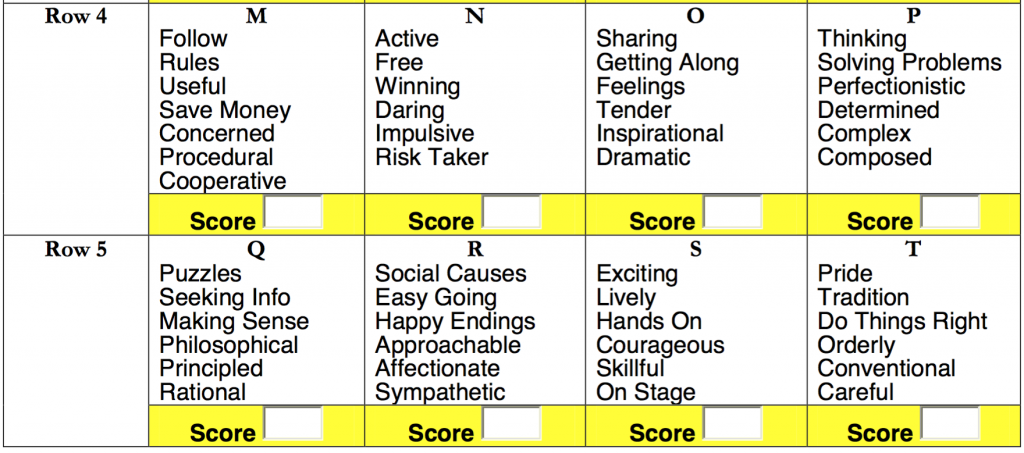
Questions:
What is this object? An airplane, a helicopter, an insect, a bird, a fairy-tale creature, an alien saucer or a hot air balloon?
Is the landing of a flying object accompanied by any damage or casualties?
Why do you think it landed here and now?
A flying object in psychology is a symbol of the lie that you are capable of. The larger the size of the object, the more you are ready to lie and the more lies in your life. If this is an unknown animal, a fabulous creature or a UFO, then by deceiving you are able to escape reality.
The presence of destruction and casualties means that you are not very concerned about the consequences of your lies, the more destruction the object produces upon landing, the more indifferent you are to the destructive consequences of your deceptions, including indifference even to exposure.
Your version of the reason why this happened is the real reasons why you are lying, which makes you lie.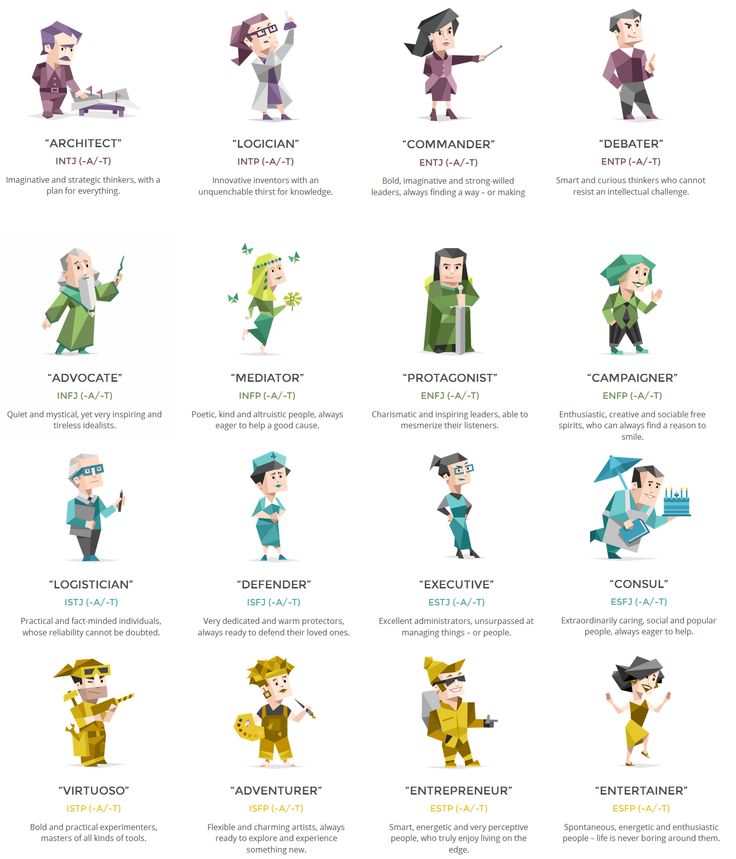 For example: an emergency on board means that you only cheat when circumstances compel you or in case of emergency.
For example: an emergency on board means that you only cheat when circumstances compel you or in case of emergency.
Desert Camel Association Test
Imagine a vast and empty space filled with only a few thorns and endless sand hills. This desert seems endless, and you and your camel are in the middle of it.
Questions:
You ride your camel endlessly and waiting for the end of this journey, like a special form of torture, plunges you into more and more despair. You are on the verge of exhaustion. Say some words to the camel that has been carrying you all this time on itself.
Dying from heat and thirst, you continue on your way and suddenly a beautiful oasis appears ahead. But someone got here before you. You know this traveler. Who is he? Name a person you know.
Finally you reach the city, your destination. The difficult journey has come to an end. What do you feel? Describe your emotions and thoughts in as much detail as possible.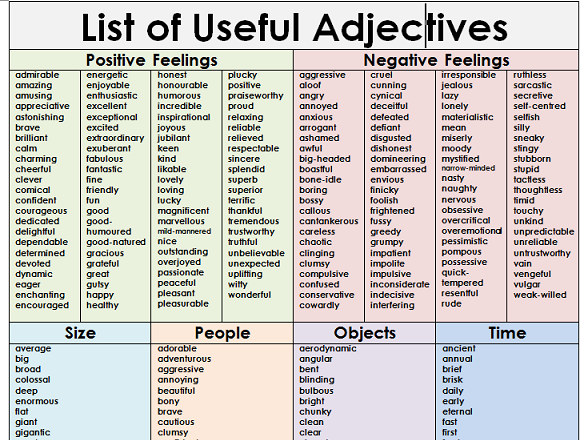
It's time to part with the camel on which you have come a long way. And as soon as you dismount, another rider climbs into the chair and takes your place. You know him. Who is this man? Name any person in your life.
Traveling through the endless desert on a camel symbolizes your path to personal independence. In particular, this scenario reveals you in a situation of parting with loved ones: loved ones, parents, friends, children. Your responses demonstrate how you might react when it's time for everyone to go their separate ways.
The words spoken to the camel reveal what you will say to yourself when you realize that love is lost and people who have been walking side by side for a long time are forced to disperse and leave. Words of encouragement: “We can do it”, “We will succeed”, “This journey will end soon”, or words of despair: “I can’t take it anymore”, “It’s all hopeless, we will die here.”
In the language of psychology, an oasis is a saving key to solving problems.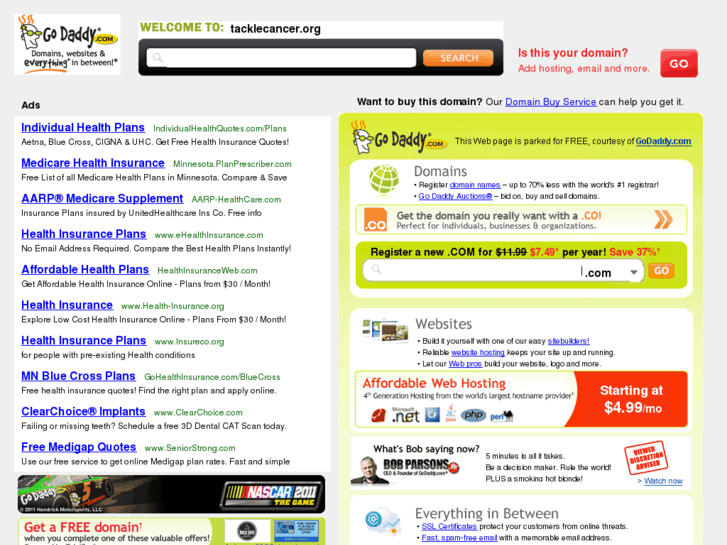 The person you meet there is someone who has helped you, supported you in the past, or someone you can count on and turn to in the future.
The person you meet there is someone who has helped you, supported you in the past, or someone you can count on and turn to in the future.
The city at the end of the journey is an internal order restored in your feelings and emotions after parting. This is your state after you have healed your broken heart. The feelings, thoughts and emotions that you expressed at the same time are your true feelings that will arise in you when you come to your senses after the loss of love.
The New Rider is a person towards whom you have strong conscious or unconscious feelings of jealousy, rivalry, or resentment.
Associative test "Road to the Beloved"
Imagine that you are in love, you really miss your loved one and you have the opportunity to meet him.
Questions:
You are visiting a loved one. There are two ways, two roads: one is short, fast and straight, but boring. The second one will take more time, but it will give interesting impressions, you will pass through beautiful places, you will be able to admire magnificent landscapes.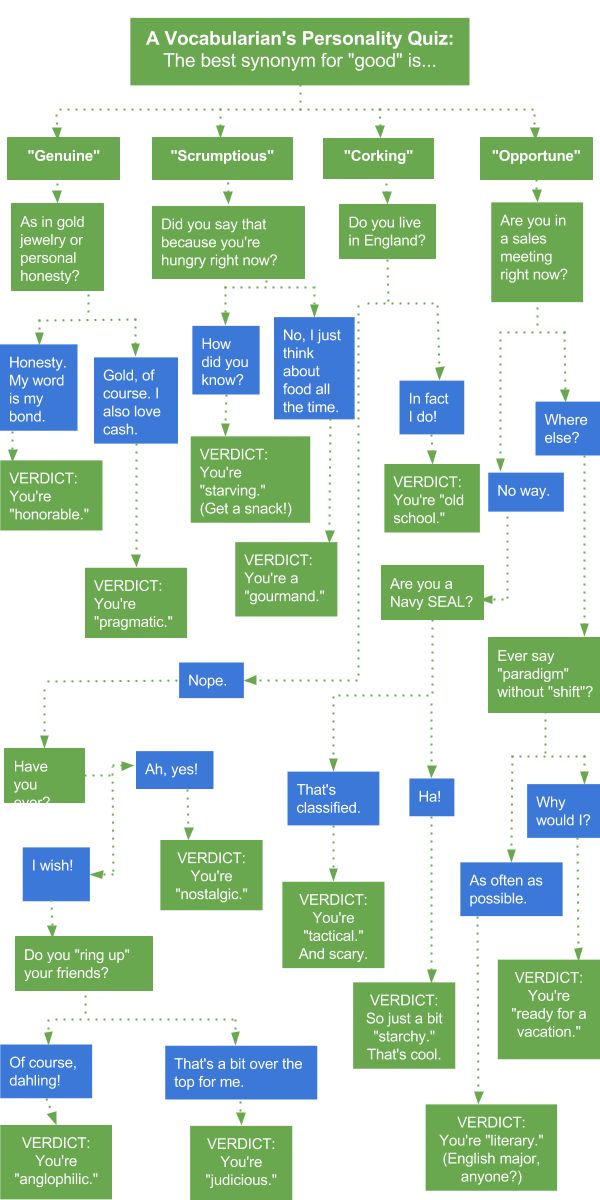 Which road will you choose?
Which road will you choose?
So, you go to your loved one and on the way you meet two flowering rose bushes. One with white and one with red roses. You decide to pick a bouquet. How many and what kind of flowers will you pick?
Finally you have reached the house of your loved one. The door is opened by one of his relatives. How will you behave? Ask to call a loved one or, after saying hello, immediately go to his room?
When you enter the room, you place a bouquet of roses, where? By the window or by the bed?
You stay overnight but sleep in different rooms. Waking up in the morning, you come to the room to your beloved, but he is still sleeping. Will you wake him up or wait until he wakes up on his own?
It's time to go home. Which road will you take now: the short one or the long one?
The first road means how you fall in love. Direct shortcut - you fall in love quickly. Long - you will look closely, evaluate a person for a long time before falling in love.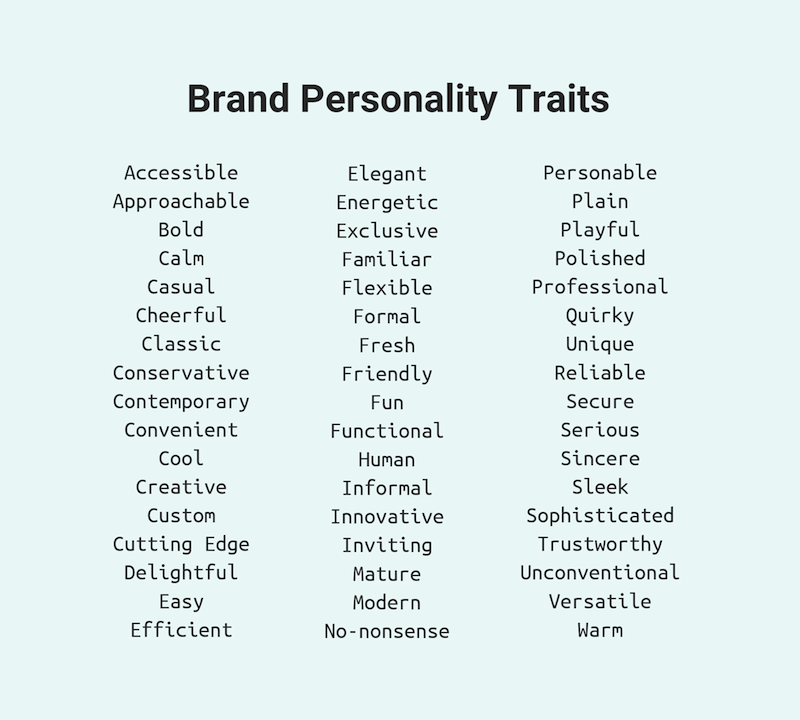
If you pick more red roses, it means you are ready to give more in love. White roses - you are used to taking more.
Shows your attitude towards difficulties in love. If you immediately go into the room of your loved one, then you are inclined to immediately and without hesitation to solve problems that arise. If you ask to call your loved one, it means that you prefer to stay away from problems, waiting for them to resolve themselves.
The place where you put the bouquet means how often and close you want to be with your loved one. By the bed - as close as possible and not parting for a minute. At the window - you prefer to be at a distance in a relationship and are ready to be content with rare meetings.
If you decide to wake up your loved one, you want to change him and expect him to change for you. If you wait until he wakes up on his own, you are ready to accept the person as he is.
Choosing the way back shows your constancy in love. Short means that when you part, you quickly lose interest in your partner.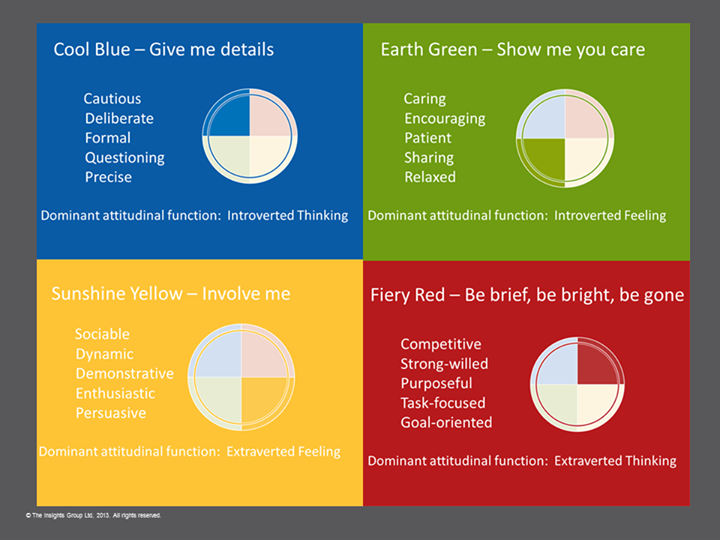 A long road is evidence that you are striving for a long-term, stable relationship and when parting, you will leave for a long time before you are ready for a new relationship.
A long road is evidence that you are striving for a long-term, stable relationship and when parting, you will leave for a long time before you are ready for a new relationship.
Association test “Under the blue sky”
Imagine a clear blue sky without a single cloud. Just thinking about it should improve your mood a little.
Now take a look around the surrounding landscape with the eyes of your consciousness. Which of the following pictures looks the most soothing and relaxing to you?
1. White snowy plain.
2. Blue sea.
3. Green mountains.
4. A field overgrown with yellow flowers.
The picture you have painted in your mind reveals your hidden talent, which resides in the depths of your calm mind.
1. White Snowy Plain
You are endowed with a special receptivity that allows you to understand situations at a glance and unravel complex problems without any evidence or explanation. You have everything you need to be a shrewd and determined person, and even a little visionary.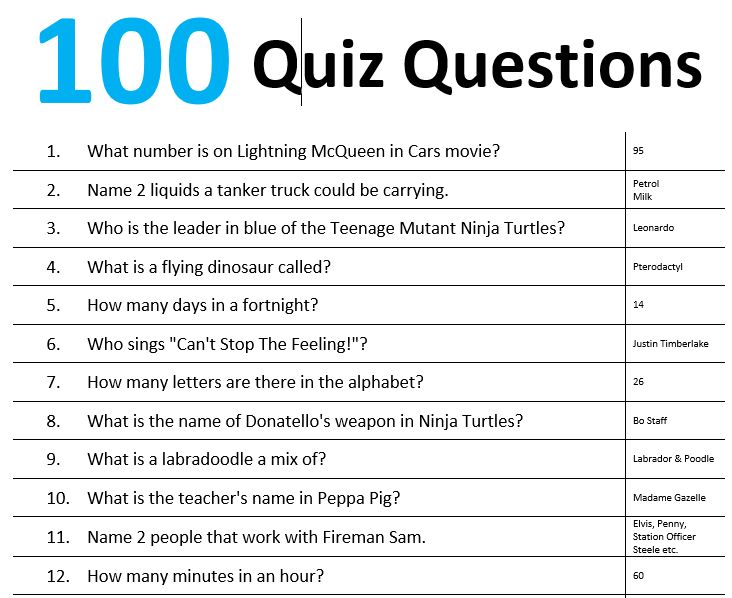 Trust your intuition; it will always guide you to the right decisions.
Trust your intuition; it will always guide you to the right decisions.
Comment: contemplative person
2. Blue sea
You have a natural talent for interpersonal relationships. People respect your ability to connect with others and how you help people of different groups come together. By your very presence, you help others to work more calmly and efficiently, which makes you an invaluable member of any project or any team. When you say, "Good job. Keep up the good work" - people know that you really think so. And for them it becomes even more important.
Comment: human organizer
3. Green mountains
You have the gift of expressive communication. It seems that you can always find the right words to express what you feel, and people very soon begin to realize that they felt exactly the same. They say shared joy multiplies, shared sadness diminishes. It seems that you are always able to help others find the right side of this equation.
Comment: human psychotherapist
4.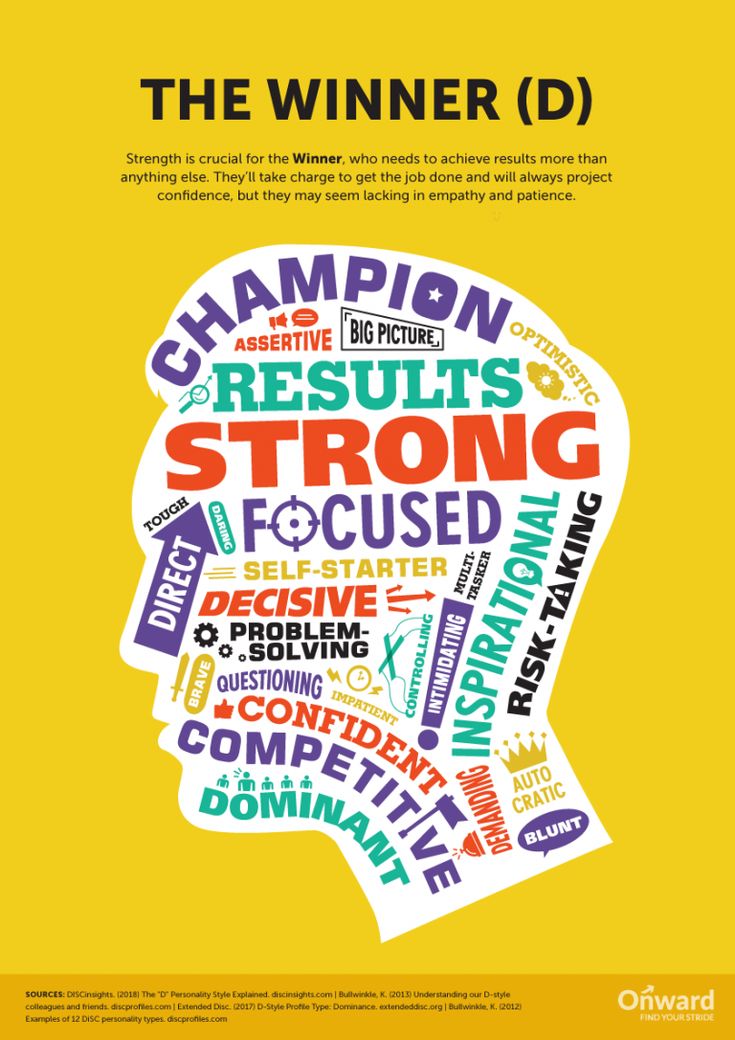 A field covered with yellow flowers
A field covered with yellow flowers
You are a storehouse of knowledge and creativity, overflowing with ideas and possessing almost endless potential. Stay in harmony with other people and never stop working towards the realization of your dreams, and then nothing will be impossible that you could not achieve.
Comment: a person is a generator of ideas, who sometimes tries to grasp the immensity.
Blue Bird Association Test
One day a blue bird suddenly flies through the window of your room and falls into a trap. Something about this lost bird attracts you, and you decide to keep it. But, to your surprise, the next day the bird changes color from blue to yellow! This very unusual bird changes color every night - on the morning of the third day it is bright red, on the fourth day it becomes completely black.
Questions:
What color is the bird when you wake up on the fifth day?
1. The bird does not change color, it remains black.
2. The bird returns to its original blue color.
3. The bird turns white.
4. The bird becomes golden.
The bird that flew into your room seems to be a symbol of good luck, but suddenly it changes color, making you worry that happiness will not last. Your reaction to this situation demonstrates how you react to difficulties and uncertainty in real life.
1. Those who said that the bird remained black look at life pessimistically.
Do you tend to believe that if the situation gets worse once, it will never get back to normal? Maybe you need to try thinking like this: if it's this bad, it can't get any worse. Remember, there is no rain that will not end, and there is no night that will not be followed by dawn.
2. Those who answered that the bird has turned blue again are practical optimists.
You believe that life is a mixture of good and bad; and that it is not worth fighting this reality. You take adversity in stride and let things take their course without undue worry or stress.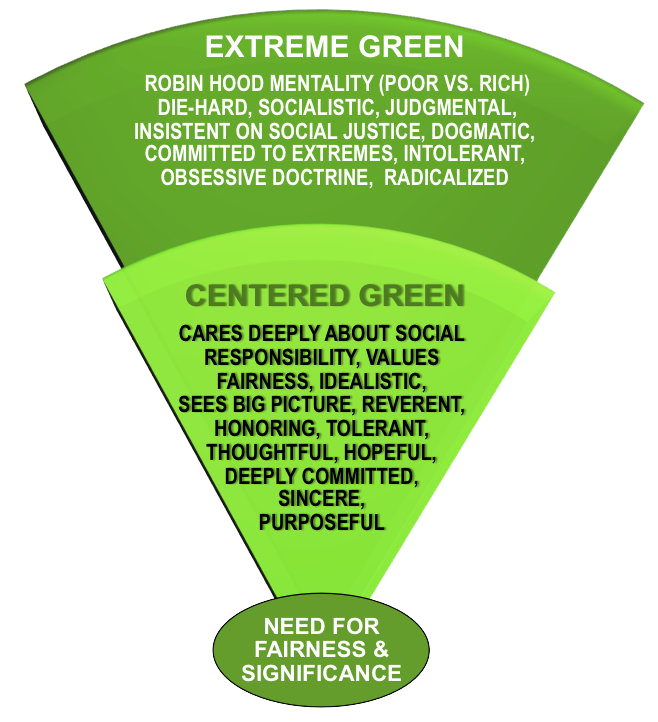 This gaze allows you to safely ride the waves of disaster and prevent them from sweeping you away.
This gaze allows you to safely ride the waves of disaster and prevent them from sweeping you away.
3. Those who believe that the bird has become white behave calmly and decisively under pressure.
You do not waste time worrying and indecisiveness, even when a crisis develops. If the situation gets too bad, you feel that it is better to stop this unprofitable business in time and look for another way to your goal than to get bogged down in unnecessary grief. This approach means that everything seems to happen naturally and at the same time, in your opinion.
4. Those who said that the bird became golden can be described as "fearless".
You don't know what pressure is. Every crisis is an opportunity for you. You can be compared to Napoleon, who said: "...Impossible is not a French word." But be careful not to let your boundless confidence get the better of you. The line between fearlessness and recklessness is very thin.
Walk Association Test
Use your imagination and answer the first thing that comes to mind.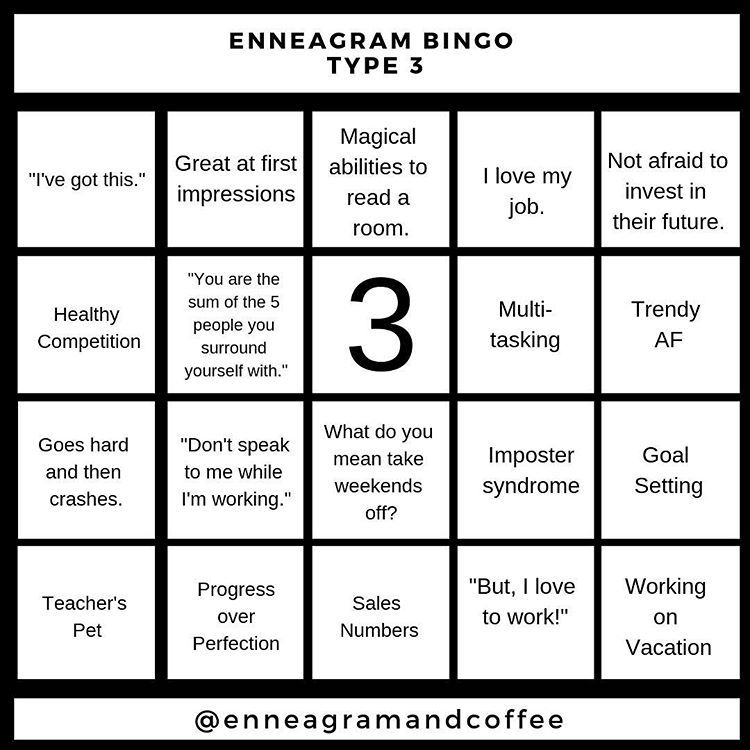
Questions:
1. You are not alone. You are walking in the forest. Who are you walking with?
2. You are going deeper into the forest. Do you see the beast? What is this animal?
3. What will happen between you and the beast?
4. You go even further into the forest. You walk onto the lot where your dream home is. Describe its size.
5. Does your dream house have a fence?
6. You enter the house and go to the dining room where you see the dining table. Describe what you see on and around the table.
7. You leave the house through the back door, there is a cup in the grass. What is it made of?
8. What will you do with the cup?
9. You are approaching the border of your property, and suddenly you see that you are standing at the edge of a reservoir? What is this reservoir?
10. How will you cross the pond?
1. The person you go with is the most important person in your life.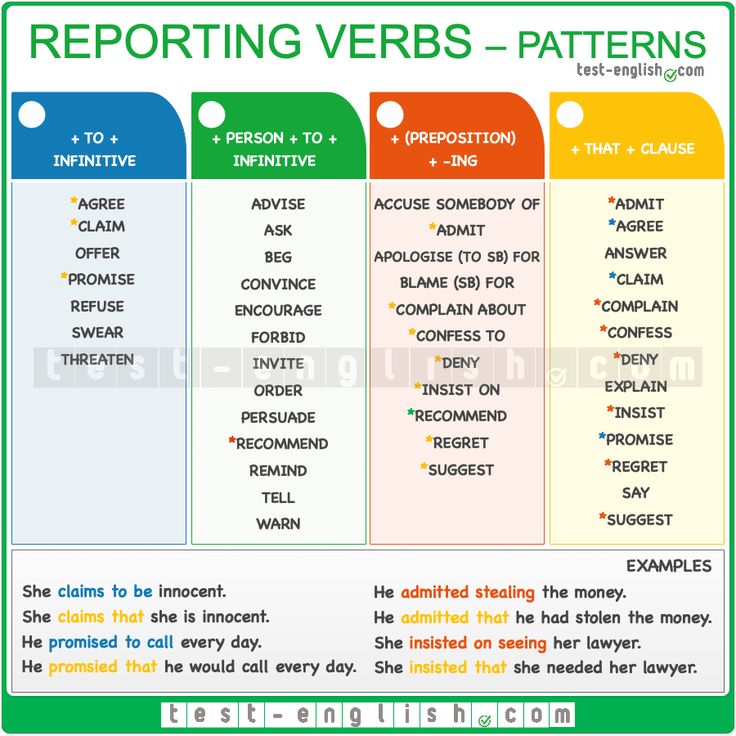 You are alone - you are most interested in your own person, or you do not feel the support of others enough to appreciate it properly and pay attention.
You are alone - you are most interested in your own person, or you do not feel the support of others enough to appreciate it properly and pay attention.
2. The size of the beast represents your perception of the extent of your problems. A mythical creature is your desires and fantasies, if it scares you, then these are ordinary fears that you need to get rid of.
3. How you act when you encounter an animal represents how you solve your problems (passive/aggressive/avoiding/ignoring)
4. The size of the house indicates the degree of your desire to solve your problems. Windows and doors testify to the search for a solution.
5. The absence of a fence indicates your openness. You are always happy with people. If there is a fence, this indicates a closed character. You prefer that people do not come to you without warning you about it.
6. If your answer doesn't mention food, people, or flowers, then you're usually not that happy.
7. The strength of the material from which the cup is made reflects how you perceive your relationship with the person you indicated in answer #1.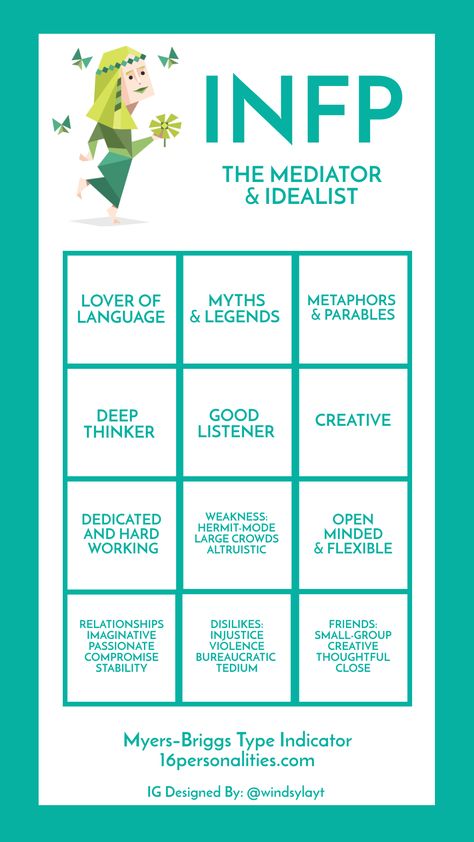 For example, foam, plastic, paper are disposable materials. Metal and plastic are more durable materials. A rusty surface from old age indicates stability and habit, affection. A broken or scratched surface indicates a relationship in which there are grievances or omissions.
For example, foam, plastic, paper are disposable materials. Metal and plastic are more durable materials. A rusty surface from old age indicates stability and habit, affection. A broken or scratched surface indicates a relationship in which there are grievances or omissions.
8. What you do with the cup indicates what you do with the person mentioned in the first answer. Look for the keyword in the description.
9. The size of the pond represents the degree of your sexual desire.
10. How wet you get indicates the relative importance of your sex life to you.
Cube, Ladder and Flower Association Test
Imagine this simple picture: sky, horizon and desert. Now try to place some objects in this landscape. The more detailed and colorful the better.
Questions:
So imagine a cube in this desert. What does he look like? What is it made of? Where it is located? What state is he in? Now imagine a ladder. What is she from? What size? How many crossbars? How is it located relative to the cube? Imagine a flower(s).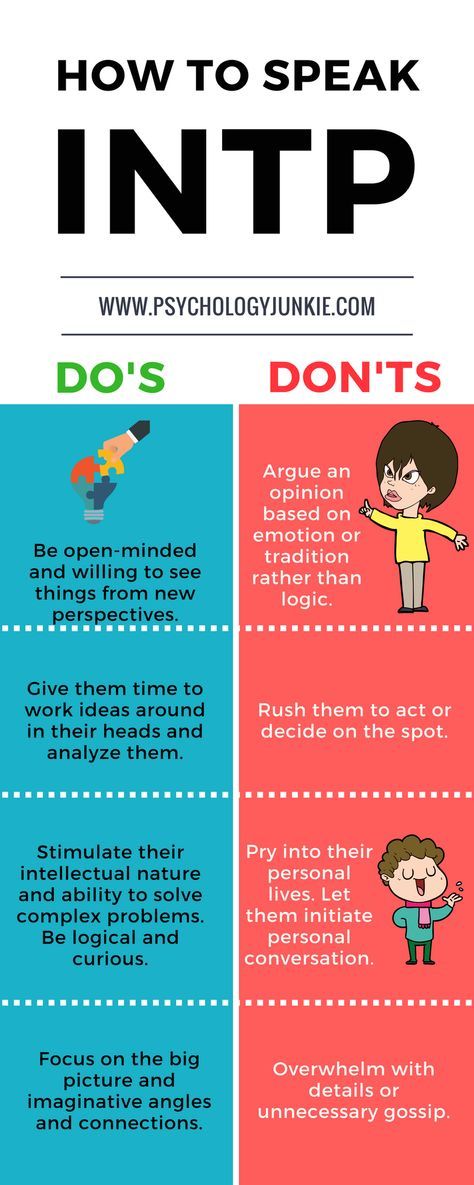 How many? What are these flowers? How are they positioned relative to the cube and stairs? Imagine a horse (horse). Color? Size? What is she doing? Where is it in the picture? Finally, imagine a storm in this landscape. Where does it occur in relation to the rest of the subject. How does it happen? What is this storm?
How many? What are these flowers? How are they positioned relative to the cube and stairs? Imagine a horse (horse). Color? Size? What is she doing? Where is it in the picture? Finally, imagine a storm in this landscape. Where does it occur in relation to the rest of the subject. How does it happen? What is this storm?
The cube symbolizes a person's idea of himself. A large half-sheet cube - exaggerated attention to one's person, an inflated ego, inflated self-esteem. A small cube is shyness, a person considers himself insignificant, they do not understand him. The cube lying on the ground feels reality well, stands firmly on its feet. Cube in the distance - feels forgotten, on the sidelines of life. A cube buried in the sand - a person feels depressed, under the weight of external circumstances. A cube in the air is a dreamer, a rich imagination, but detached from reality. The cube protrudes beyond the horizon - great ambitions (and vice versa). The cube stands on the edge - unstable life.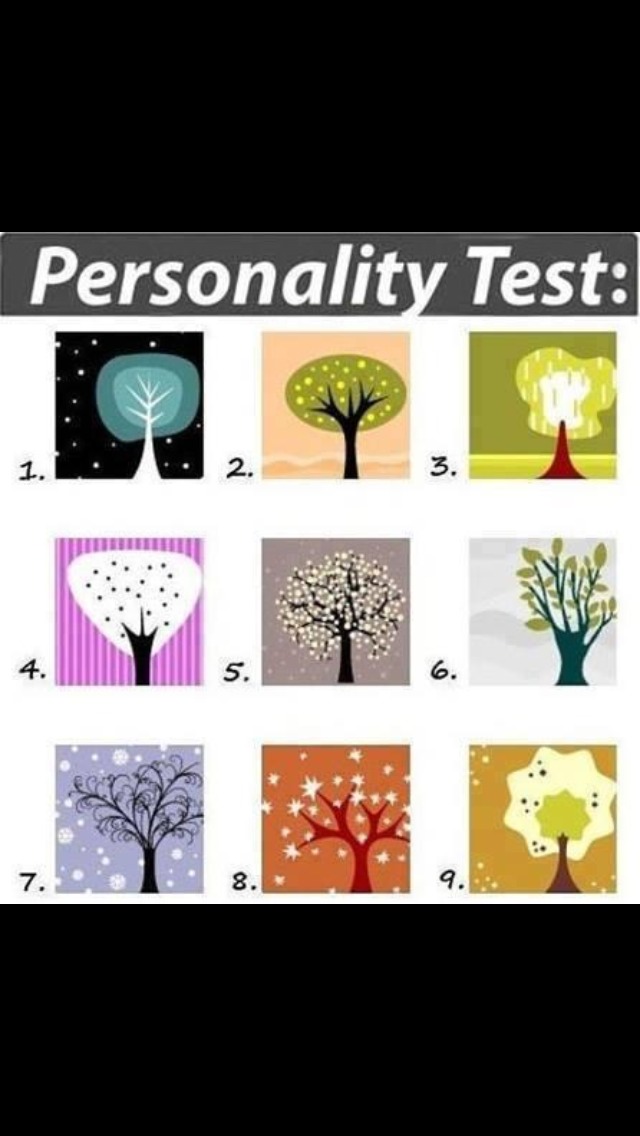 A cube made of durable material - self-confidence, solidity. Cube of gold - considers himself priceless. Glass cube - purity and innocence. A cube filled with something cloudy - hates itself. Empty inside - feels empty, unsatisfied.
A cube made of durable material - self-confidence, solidity. Cube of gold - considers himself priceless. Glass cube - purity and innocence. A cube filled with something cloudy - hates itself. Empty inside - feels empty, unsatisfied.
The staircase symbolizes the nearest social structure of a person (friends, relatives). Long, with many crossbars - sociability, a large circle of friends. Staircase made of unusual material - feels that his friends are strange, not like everyone else. The staircase is in poor condition - he believes that there are spoiled people around him. The staircase is far from the cube - does not let others into their personal lives, is surrounded by a shell. The ladder is leaning against the cube - he believes that he does a lot for friends, gives them more than they, he is surrounded by weak people. Ladder on the cube - friends / family suppress, interfere too much in personal life. Staircase under the cube - feels supported. A solid ladder - surrounded by reliable people, or striving for this.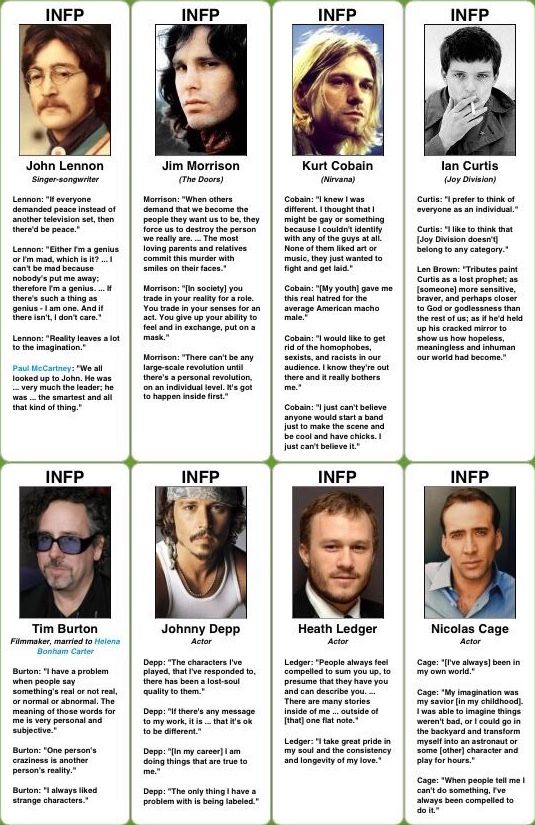
Flowers - the role of children in human life. Number - how many children I would like to have: if there are many - most likely the person works with them (for example, a teacher) or wants to be surrounded by them, work with them. Flowers close to the cube - really needs children. Brightly blooming flowers - dreams of a bright fate for children. Crumpled Flowers - Surrounded by spoiled children. Flowers bend in the wind - afraid of difficulties in their children. Everywhere and cover the cube - the children tire him. Beautiful flowers (roses, poppies) - loves children very much.
A horse symbolizes a person's idea of a current sexual partner, if about the future, then what he wants. Strong, big - you need a reliable partner. Color indicates character, temperament, brightness, coldness, etc. Close to the cube - needs emotional and physical closeness with a partner. Far away - in no hurry to fully open up to a partner. The horse (horse) bites, sniffs, licks the cube - his idea of \u200b\u200bcaresses.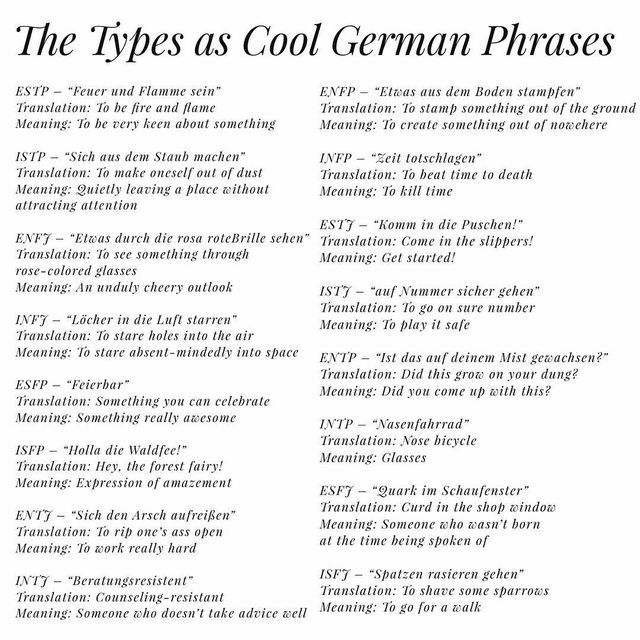 A small, obedient horse (horse) - wants to dominate relationships. Unbridled horse (horse) - you need a wayward partner. Attached - wants to always keep a partner under control. The horse (horse) is doing something with the stairs - the partner's relationship with his loved ones. Horse (horse) in the distance - feels abandoned.
A small, obedient horse (horse) - wants to dominate relationships. Unbridled horse (horse) - you need a wayward partner. Attached - wants to always keep a partner under control. The horse (horse) is doing something with the stairs - the partner's relationship with his loved ones. Horse (horse) in the distance - feels abandoned.
A storm symbolizes a person's attitude to life's problems. A storm in the distance - there are practically no troubles now. Approaching - afraid of a crisis in life. Leaves - troubles recede. Big storm - feels like in a huge pit of failures. The storm passes by - problems affect him little. A small thunderstorm is not particularly afraid of upcoming problems.
Desert Mirage Association Test
1. Imagine that you are standing on the edge of a forest. The forest is still far away. How do you imagine it? High or low, big (in size) or not?
2. You are now entering this forest. Describe it. How do you feel inside? What kind of forest? Which trees are dominated by pines, spruces or deciduous trees?
3.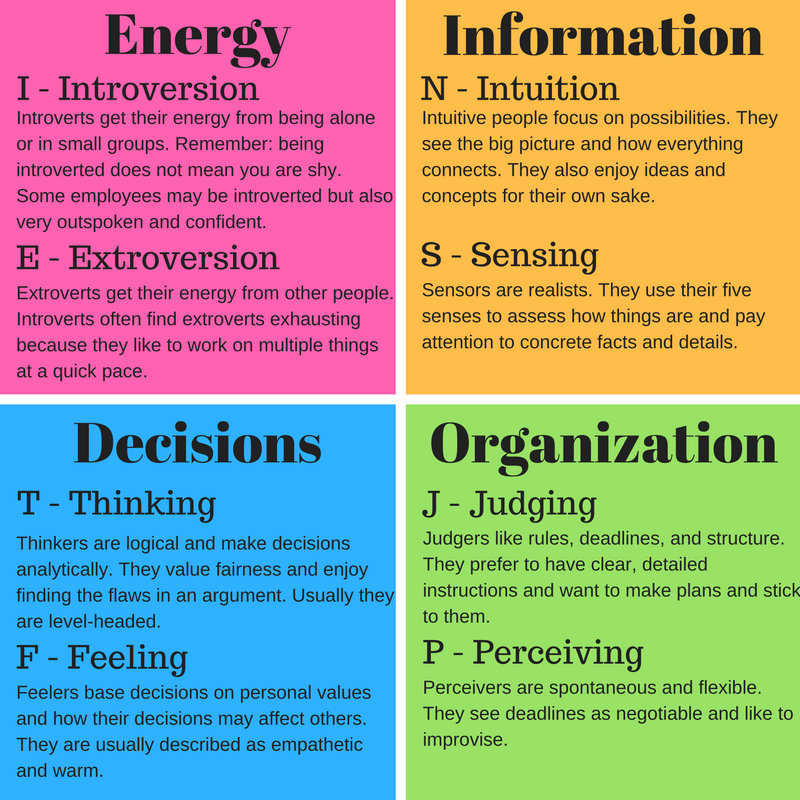 You go further through the forest and meet a monster on the way. Describe it. What are you going to do?
You go further through the forest and meet a monster on the way. Describe it. What are you going to do?
4. The forest ends, and you suddenly find yourself in a hot desert. The heat is prohibitive, there are only dunes around. You are overcome by a feeling of hunger and thirst - after all, you have been here for several days. Fatigue is on the rise. You are barely dragging your feet, making your way through this heat to a place only known to you, and suddenly you find the key to the castle in the sand ... Examine it carefully. Describe what shape it has, what material it is made of. What emotions did you experience when you found the key? What will you do with it (leave it or take it with you)?
5. You have dealt with the key and are moving on. Around the same hot sand, exhausting heat. And you haven't rested in such a long time! The landscape has not changed for several days. And now, among this kingdom of sand, you saw a reservoir ... Isn't it a mirage? What are your emotions at this moment? What will you do (for example: rush to the lake, slowly approach the stream and wash yourself - everyone may have their own options for reservoirs and actions)? Would you rather stay by the water or move on?
6.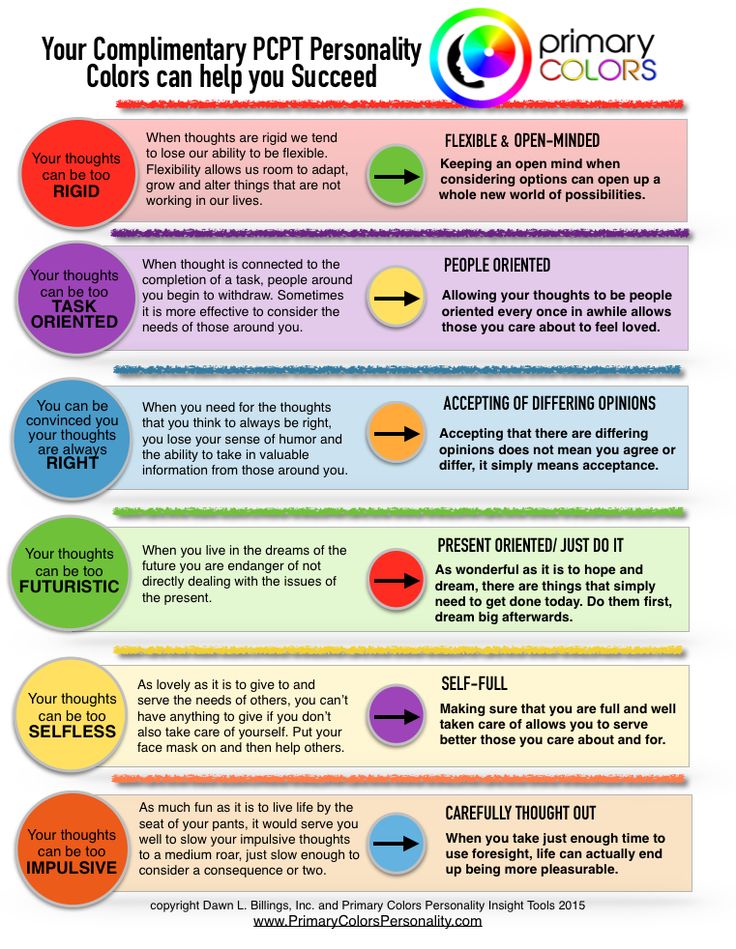 The lake is left behind. You are back in the desert - slowly moving towards your goal. And suddenly you stumble upon a vessel ... Describe what shape it has, what material it is made of. Do you wonder what is inside it? Will you look into it? If yes, what will you see there?
The lake is left behind. You are back in the desert - slowly moving towards your goal. And suddenly you stumble upon a vessel ... Describe what shape it has, what material it is made of. Do you wonder what is inside it? Will you look into it? If yes, what will you see there?
7. You have examined the vessel and continue on through the hot desert. The heat has exhausted you completely, but you do not stop. Suddenly there is a wall in front of you. It seems that there is no end to it, and you need to move forward... What feelings did you have when you “meet” with the wall? Describe this wall. What is it like (high, ruined, impregnable…)? What will you do to get to the other side, or would you still prefer to stay on this one?
8. So, the wall is left behind. You walked through the desert for a long time, and, finally, “the reward found a hero” - you ended up in an oasis. It has everything you could possibly want. This is a real paradise on earth! You enjoy all the benefits and enjoy life.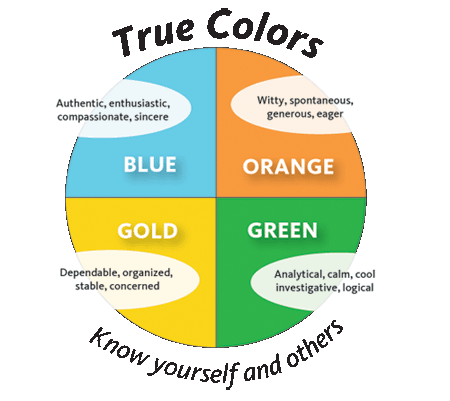 And one fine day on the horizon you notice a caravan going… Your actions: will you go towards the caravan or hide in your paradise? Or maybe you just talk about what is happening in distant countries and come back?
And one fine day on the horizon you notice a caravan going… Your actions: will you go towards the caravan or hide in your paradise? Or maybe you just talk about what is happening in distant countries and come back?
1 and 2 questions.
The forest and everything woody that comes along the way are connected with the intellect. The height and size of the forest correspond to the strength of the intellect and the vastness of knowledge. Looking at the forest from the inside is a self-assessment of your level. The outside view is the evaluation of the evaluation. In other words: a person evaluates how other people evaluate him. This is the middle of the row:
I evaluate myself.
I evaluate how other people evaluate me.
I evaluate how other people evaluate me, how I evaluate them and myself.
People with adequate self-esteem usually have the same size inside and outside the forest.
If the forest consists mainly of pines, then the intellect is of a logical warehouse.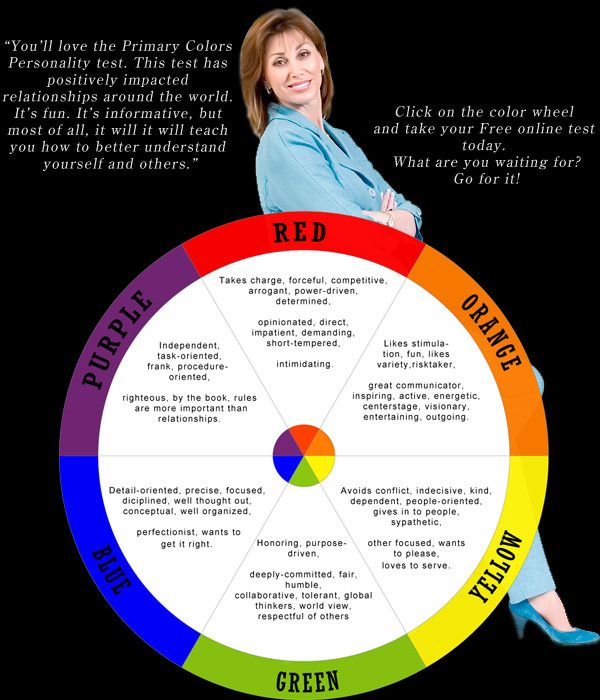 If from deciduous - sensual. Well, if the forest is mixed, then the type of thinking is also mixed (that is, it is difficult to single out a logical or sensual type).
If from deciduous - sensual. Well, if the forest is mixed, then the type of thinking is also mixed (that is, it is difficult to single out a logical or sensual type).
If the forest is littered with windbreak and with ravines, then a person is in a state of solving global problems. This happens if the picture of the world around seems complex and confusing. More difficult than others think.
3 question.
The monster describes your attitude towards enemies and how you imagine them. Your actions towards the monster describe your behavior towards your detractors.
4 question.
Shows how you feel about friendship.
The key is like Pinocchio's: big, beautiful, golden - accordingly, the choice of friends takes place. Friends should be good as a match and, most importantly, always ready to provide support, including material (the approach, frankly, is utilitarian). Friendship for you is a ritual. You need friends to show your worth.
The key is simple, small, metal - you do not make high demands on your friends.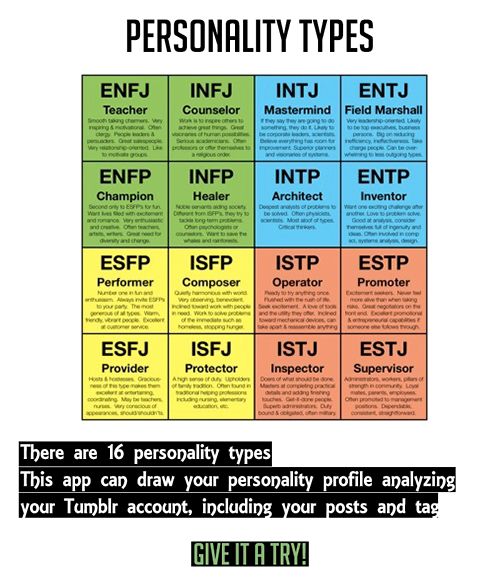 A friend should be easy to communicate with, not strain with ritual actions.
A friend should be easy to communicate with, not strain with ritual actions.
The key to the barn lock - You want your relationship with friends to be stable.
The key to an old box - you treat the choice of friends like buying antiques - everyone should be with their oddities, and it is not necessary to introduce them to each other. But you can say on occasion: “Here I am friends with one guy, so he ...”. At the expense of friends you are trying to assert yourself.
If you did not pay much attention to the key, it means that you are closed, suspicious and suspicious in communication. Do not trust even close people. Your main motto: "Do not let anyone close to you."
Consider the key and leave it - you show interest in the people around you, but you are not inclined to turn friendships into a burden.
You try not to "get into the soul" of a friend and do not allow the destruction of your own psychological comfort.
Take the key, hold it in your fist or hang it around your neck - you are serious about friendship and are ready to fulfill your friendly duty at all costs, even if it harms your interests.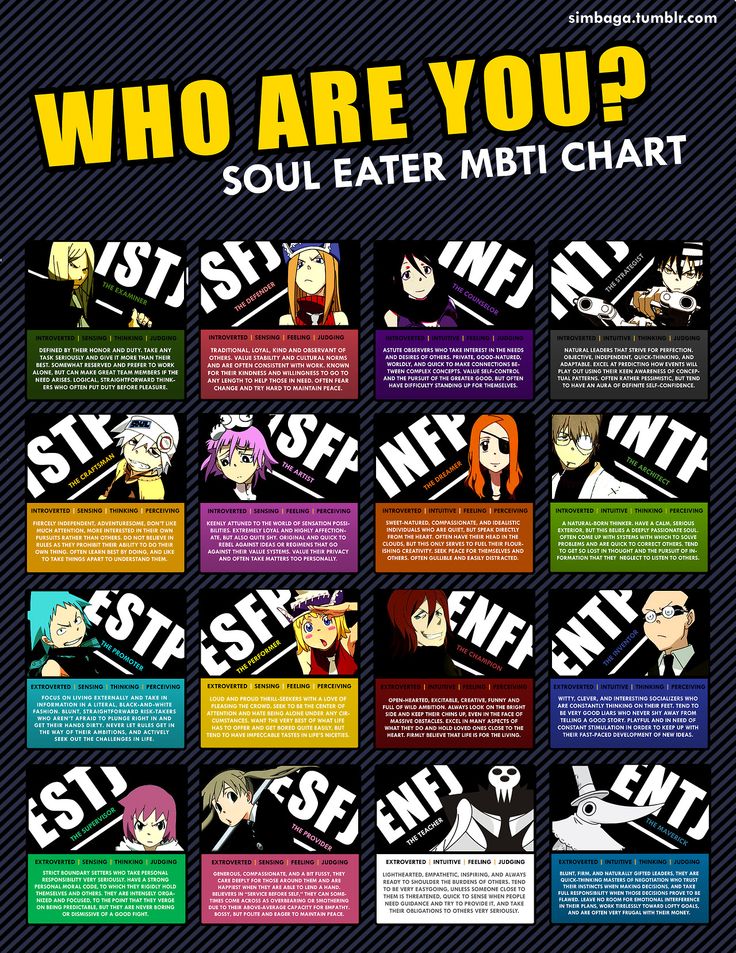
Put the key in your pocket - try not to lose sight of your old friends, you want to “hide” them for a rainy day.
5 question.
This paragraph reveals your attitude towards intimacy.
Mirage is your subconscious disbelief in the reality of sexual relations. You are chasing an illusion, a fantasy. Therefore, the real sexual experience cannot satisfy you (the real partner will not be as good as the hero from your fantasies).
Clear transparent lake - an idealistic attitude towards sex. You strive for a crystal clear relationship.
Dirty desert lake - subconscious, often suppressed, condemnation of sex. You think sex is a vicious activity.
Waterfall - you associate sex with powerful force.
Brook - You consider sex to be the source of life.
You rush to the pond with all your tired legs - you want to get rid of annoying problems with the help of sex.
Approach gradually, first tasting the water with your foot - You tend to be wary of your partner.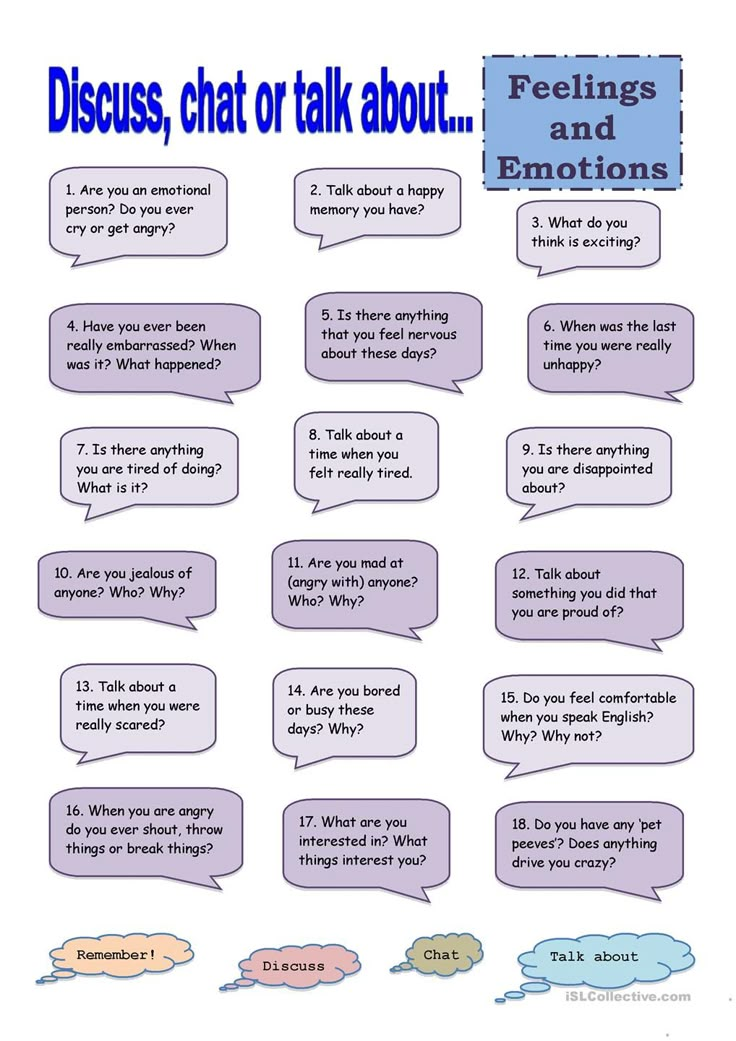 You strive to learn as much as possible about him, so as not to be mistaken; want to calculate everything in advance.
You strive to learn as much as possible about him, so as not to be mistaken; want to calculate everything in advance.
Approach the water, but do not enter it - inability to open up in sexual relations, subconscious fear of a partner.
Drinking, swimming, diving - you enjoy sexual relationships, they relax you.
Settled by the pond in a sun lounger - You want the sexual relationship to be stable, so you avoid novelty.
6 question.
A vessel found in the desert symbolizes your self-esteem.
An earthenware jug indicates a sense of proportion; iron, copper or ceramic - about its almost complete absence.
You took a jug and looked into it - it means that you are striving for self-knowledge.
You didn't take the jar and didn't want to look into it - surely you don't want to know the truth about yourself; this may be due to low self-esteem and the desire to disguise it.
The jug is empty or full of sand - low self-esteem.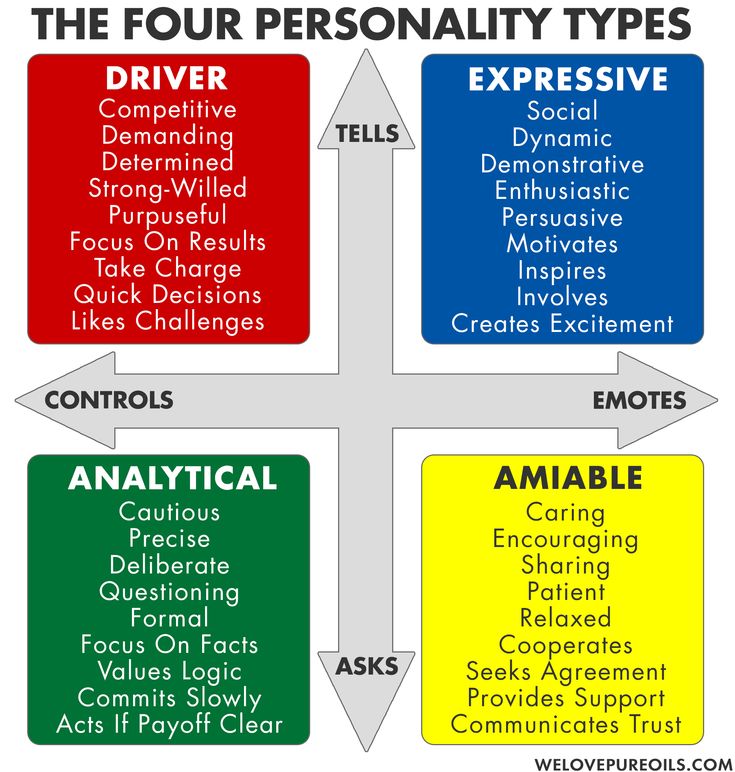
The jug is filled with precious stones, gold - inflated self-esteem, a constant desire to embellish oneself.
The jug is filled with water - Your self-esteem is close to adequate, reflects the desire for self-development.
7 question.
In this section you will learn about your attitude to problems and their solution.
The wall is high, there is a feeling that it cannot be overcome - You treat life's difficulties as something insurmountable, often making an elephant out of a molehill.
The wall is high, but with uneven masonry, which you can climb up - You always strive to overcome obstacles, nothing is impossible for you.
Broken wall - You tend to level problems, trying to console yourself.
Sit under the wall waiting for help - You are not confident in your own abilities, you depend on circumstances.
You will look for how to get around the wall - subconsciously you want to avoid any problems, so you try to avoid sharp corners.